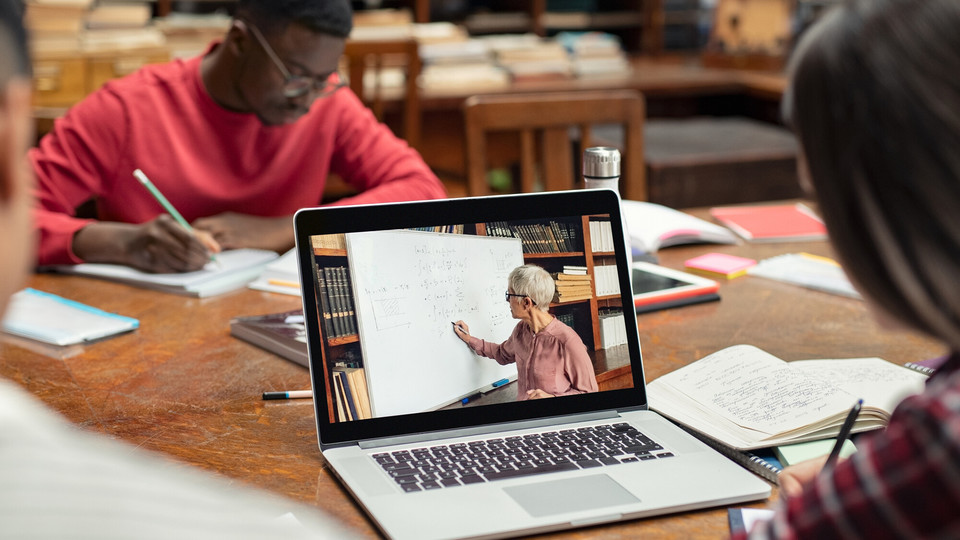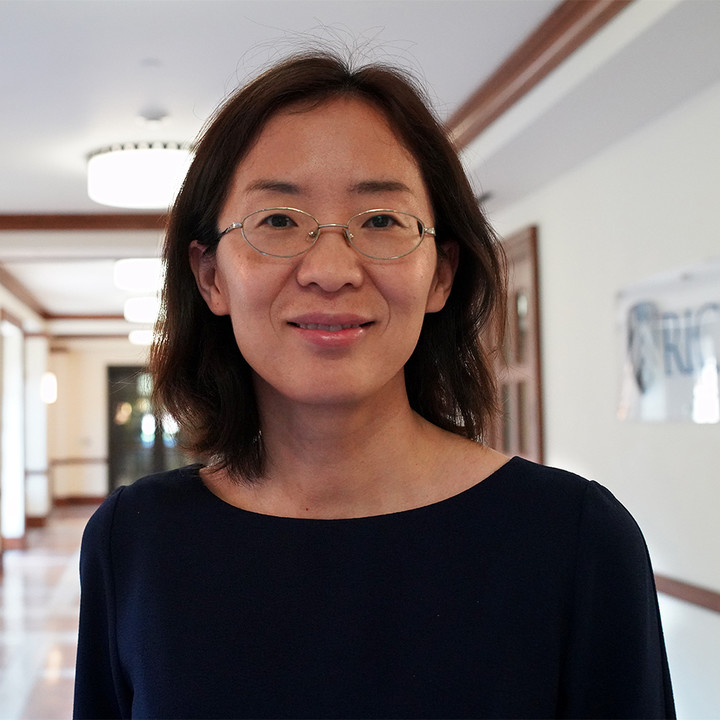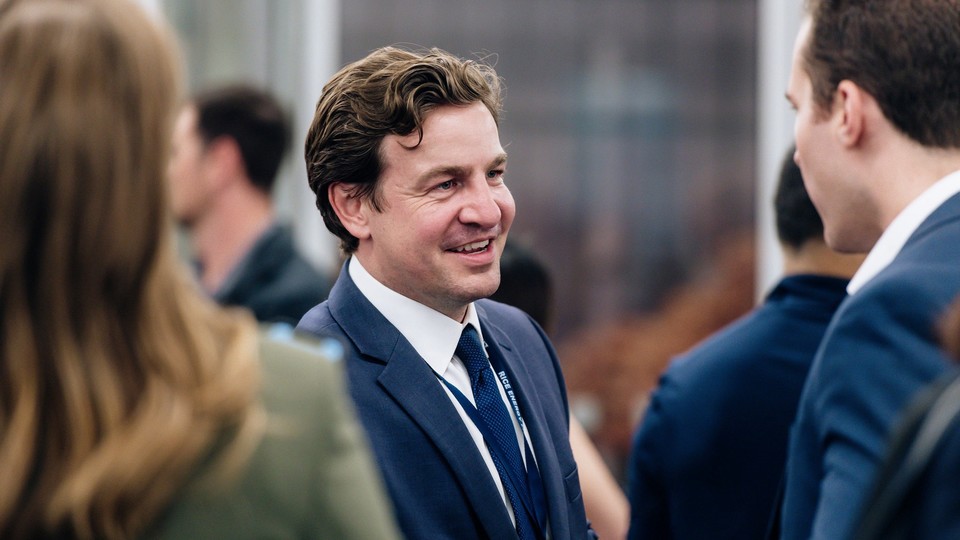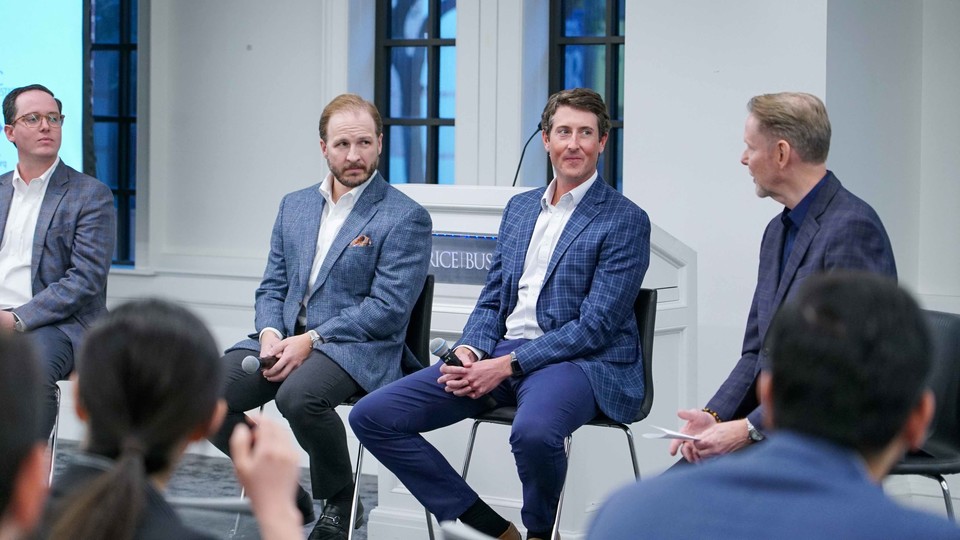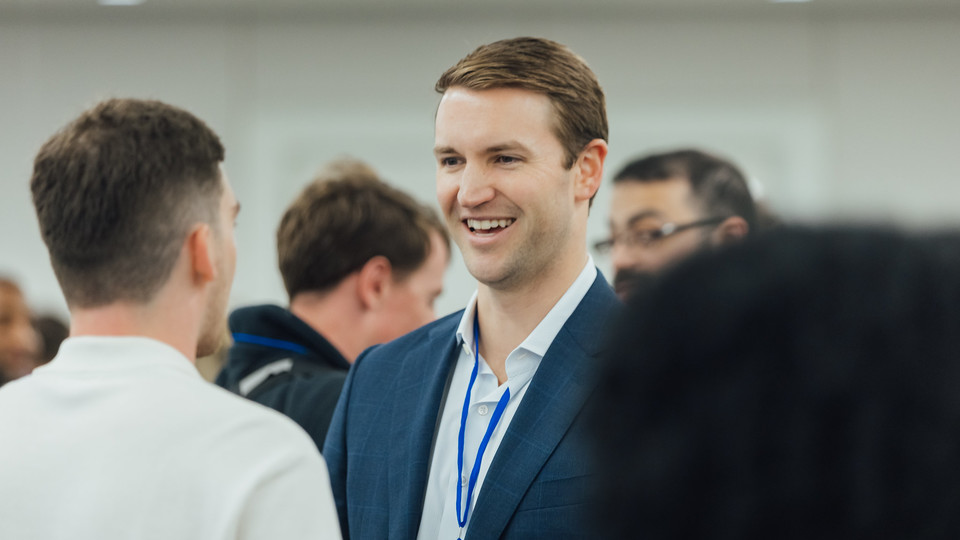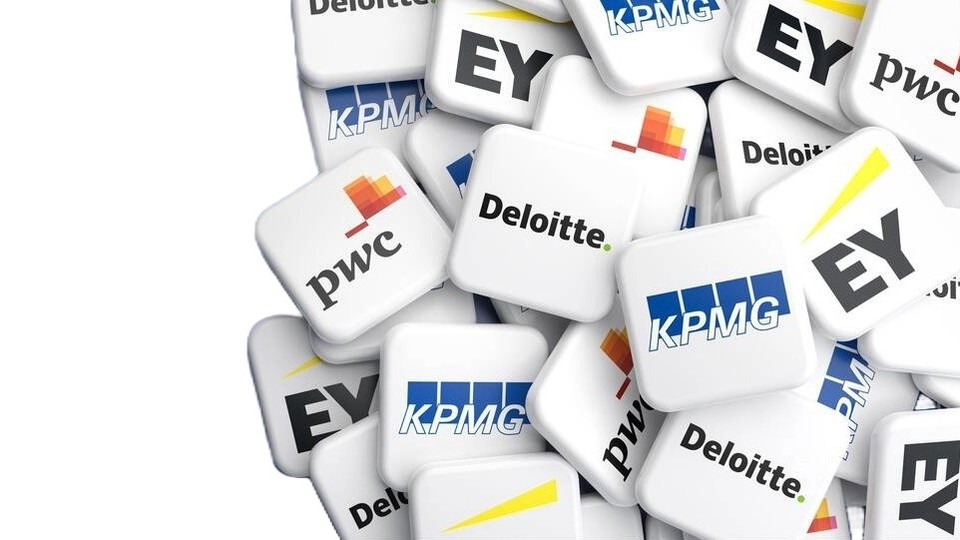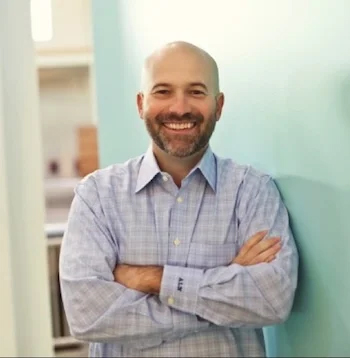
Houston's placemaking renaissance: How urban design shift could boost economy and livability
Houston's urban landscape is evolving beyond its iconic skyline, yes Rice Business professor Burdette Huffman — with a focus on creating vibrant, walkable spaces that could reshape the city's economy and quality of life.

Rice welcomes 3 new members to board of trustees
Rice University has appointed three distinguished alumni to its board of trustees: technology entrepreneur A. Lanham Napier ’93, media and software innovator William “Bill” V. Neville III ’84 and energy and sustainability leader Charlos C. Ward ’98.
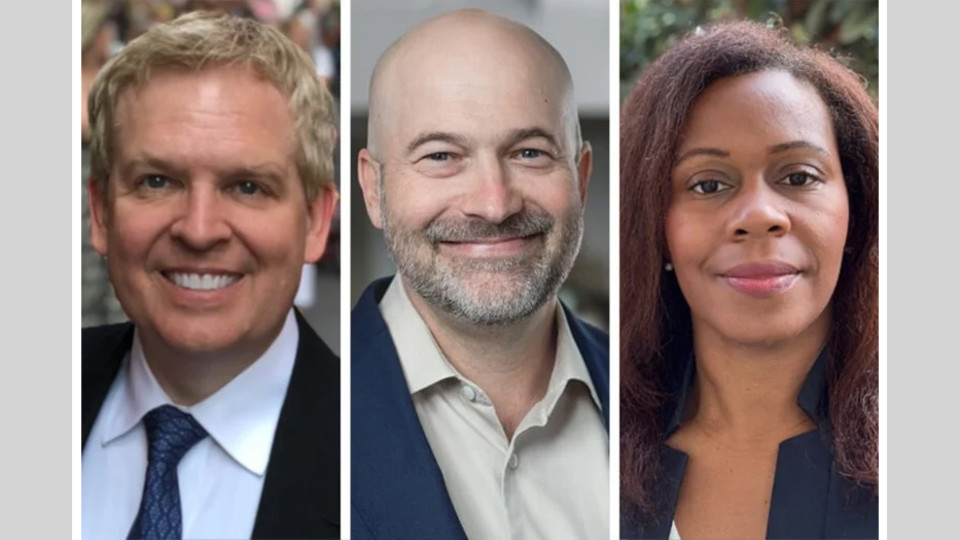
Rice University has appointed three distinguished alumni to its board of trustees: technology entrepreneur A. Lanham Napier ’93, media and software innovator William “Bill” V. Neville III ’84 and energy and sustainability leader Charlos C. Ward ’98. Each brings deep expertise, a commitment to innovation and a strong track record of service to the university and society at large.
“On behalf of the Rice community and the board of trustees, I am pleased to announce our newest trustees, all proud alumni,” said Robert T. Ladd, chairman of the board of trustees. “Lanham, Bill and Charlos have distinguished themselves in their careers and in supporting their communities. There is much to accomplish in the years ahead at Rice, and our new trustees will play an important role.”
“We are honored to welcome Lanham, Bill and Charlos to the Rice University Board of Trustees,” President Reginald DesRoches said. “Each of them embodies the values that define Rice — innovation, impact and a deep commitment to service. Their leadership across technology, media and sustainability, combined with their enduring ties to Rice, will be instrumental as we continue to advance our mission and expand our reach in Houston and around the world.”

Napier is a tech entrepreneur and co-founder and CEO of BuildGroup, a venture capital firm supporting emerging software companies with permanent capital and hands-on partnership. Napier previously served as CEO of Rackspace Hosting, helping grow the company from startup to global leader in cloud computing.
He earned a Bachelor of Arts in economics from Rice and a Master of Business Administration from Harvard University. A former resident of Wiess College, he is married to fellow Rice alumna Dr. Dacia Napier ’93. The couple co-founded Project 23 and Moyo Goods, supporting health and education initiatives in Africa. They have two adult children, Cade and Avery. Lanham Napier is the son of the late H. Albert Napier Jr., a longtime professor at Rice’s Jones Graduate School of Business.
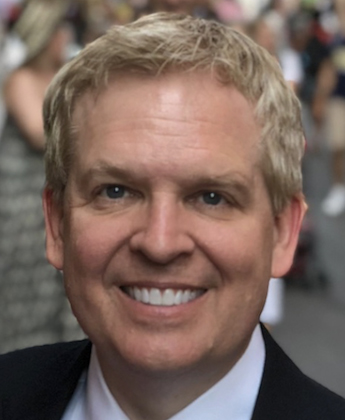
Neville is the founder and managing member of US Viking LLC, a software firm based in the U.S. Virgin Islands that developed the Electronic News Production System platform used by more than 900 newsrooms worldwide and marketed by The Associated Press. He also led Broadband VI, a leading internet provider in the U.S. Virgin Islands that was acquired by Liberty in 2021.
Neville earned a bachelor’s degree in computer science, mathematical sciences and mathematics from Rice and an MBA from Columbia University. A former member of Rice’s Reunion Giving Committee, he has also served on the board of the Good Hope Country Day School in the Virgin Islands. He and his wife, Connie Jones Neville, were high school sweethearts and have two adult children.
Ward is a product developer at Replenishment, where she leads efforts in agricultural technology to advance health and sustainability. She previously spent more than 25 years at BP, including as strategic partnership manager for the Americas.
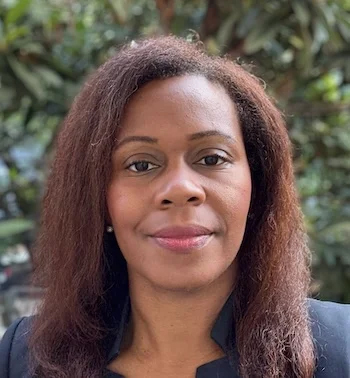
Ward holds a Bachelor of Science in chemical engineering, a Bachelor of Arts in economics and an MBA from Rice. She actively supports the university through service on the School of Engineering and Computing advisory board and the REINVENTS external advisory committee and with multiple alumni and student engagement programs. She is a former board member of the Houston Area Urban League and the Challenger Learning Center of Alaska. Ward is married to Lee Riley, managing partner of a consulting firm, and they have two sons, including Rice alum Julian H. Riley ’25.
You May Also Like

Rice University’s Jesse H. Jones Graduate School of Business today announced the launch of its Graduate Certificate in Healthcare Management program, a 10-month, credit-bearing professional credential designed for current and aspiring leaders seeking deep expertise in the business of healthcare.
Shaping The Future of Retail feat. Ramon Marquez ’25 and Taylin Luzcando
Season 5, Episode 10
Hear about Ramon’s career journey from his grandfather’s general store in Mexico to the C-suite of some of the biggest global retailers, as well as why he decided to pursue an MBA at Rice Business.
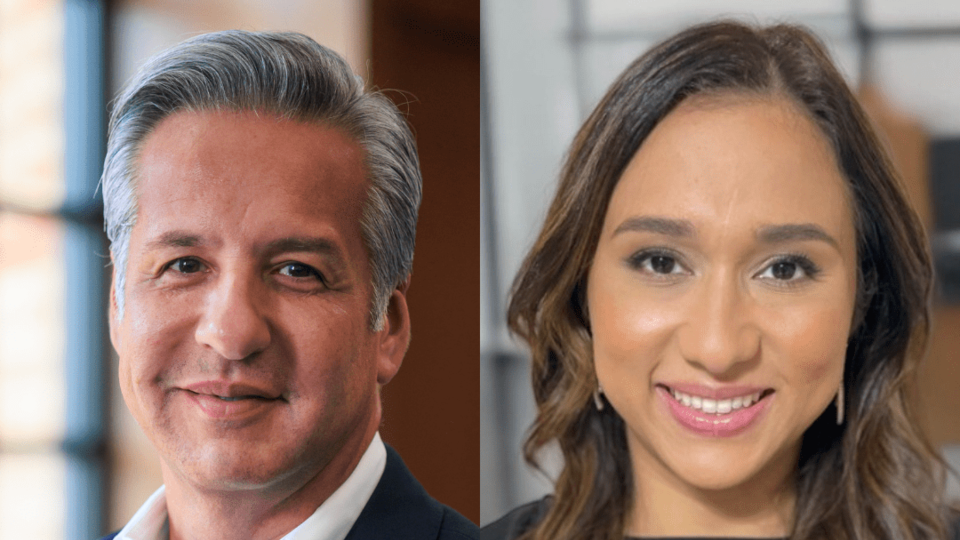
Owl Have You Know
Season 5, Episode 10
Retail executive Ramon Marquez can point to virtually every store in a shopping mall and explain how he helped that brand grow.
With a passion for retail dating back to his childhood, he’s built a career as a leader in merchandising, product management and retail operations for major retailers like JCPenney, Abercrombie & Fitch, Old Navy, and is now shaping the future of Kmart and Sears.
As a newly minted MBA graduate, Ramon gained not only a degree from Rice, but also a meaningful board appointment with Panama-based company, Effluz. After working with Effluz on his Global Field Experience, Ramon remained close with the company, which was founded by Taylin Luzcando and specializes in premature baby clothing and accessories.
Ramon and Taylin join co-host Brian Jackson ’21 to chat about Ramon’s career journey from his grandfather’s general store in Mexico to the C-suite of some of the biggest global retailers, as well as why he decided to pursue an MBA at Rice and how he’s made an impact at Effluz. Founder Taylin also shares the personal origins of Effluz and why entrepreneurs should jump at the chance to partner with Rice’s Global Field Experience program.
Subscribe to Owl Have You Know on Apple Podcasts, Spotify, YouTube or wherever you find your favorite podcasts.
Episode Transcript
-
[00:00] Brian Jackson: Welcome to Owl Have You Know, a podcast from Rice Business. This episode is part of our Flight Path series, where guests share their career journeys and stories of the Rice connections that got them where they are.
Today, we're sitting down with someone who has spent more than three decades leading in the retail industry. Ramon Marquez, a recent graduate of Rice Business' Online MBA program, has built his career at iconic brands like JCPenney, American Eagle, Abercrombie & Fitch, and Old Navy. Along the way, he's helped guide these companies through evolving consumer trends, digital transformation, and brand reinvention.
Even with all that experience, Ramon came to Rice Business hungry for more and found that in one of the defining moments of his MBA, the Global Field Experience, where he partnered with a growing startup in Panama called Effluz. That company founded by Taylin Luzcando, who joins us for this special episode, offers products for premature babies and growing families, inspired by Taylin's own experience as a mother of premature twins. After working together during the GFE, Ramon was invited to join the Effluz board, transforming a class project into a real-world partnership.
Hi! Welcome, Ramon. I'm very happy to have you joining me here on Owl Have You Know.
[01:23] Ramon Marquez: Thank you, Brian. It's an honor to be here.
[01:25] Brian Jackson: Well, you've had such a remarkable career. And it's been in retail, which I think is such an interesting space. And you're now also wrapping up your MBA at Rice Business. So, seeing the pinnacle, the peak of the mountain, I want to know, really, the beginning. What made you climb it? Where did your journey in retail begin? And really, what drew you into that industry in the first place?
[01:48] Ramon Marquez: You know, retail's been in my family. My grandfather had the general store in the small town in Mexico where my father grew up. And I will go to the store and help behind the counter. So, that's, like, my very first memory in retail, fascinated with making money and helping others, right, helping customers. And fast forward during college, I started selling sweaters. I would fly to L.A., buy sweaters, and then sell them to my college friends.
And it just started because somebody wanted to buy a sweater I had on. And it just went from there. Fast forward when I was getting ready to graduate. JCPenney came to UTEP where I went for undergrad. And they were looking for people to train in the U.S. and then open the stores in Mexico. And I jumped on that wagon. I was excited about the free trade agreement that the U.S. then was signing. This was many years ago.
[02:41] Brian Jackson: Isn't it NAFTA?
[02:41] Ramon Marquez: NAFTA. Yes. NAFTA. So, Penney was one of the very first retailers that, you know, made plans and made announcements to go there. And I remember even discussing it that they were doing that. And then before I knew, I was part of the people that they had announced they were going to hire to go there. So, I came to Houston to do a training for a year. And then the plans were for me to move back to Mexico and run the stores. And the training came. And I got promoted.
And my career took a different path. And then I never went back to open the stores. I was, you know, moved up pretty fast through the corporate ladder, became a director at a very young age. Penney started centralizing buys instead of buying at the store level. There were districts and then regions. And I grew with those changes and piloted a lot of those new ways of working. And then Old Navy came. And Old Navy had 100 stores.
They were the fastest growing company in retail at that time. And I interviewed and walked into their building. And I was like, "I have to be part of this." Just the energy brought me in. And I moved to San Francisco. So, I've been very lucky to work for great companies and to be able to capture the moment where it was a mutual benefit. It was a good career move for me, but also it was a time where they needed what I had to bring to the table. I worked only for five years.
You know, like I said, we had 100 stores. By the time I left, we had 1,000. So, I got to see the growth coming in, you know. Every day, there was a different store count. And we were managing to that. By the way, my background is in apparel and, for the most part, has been buying products. So, we're called merchants or buyers. And obviously, I grew up the ladder and had different positions, but, you know, my core competency has been in product.
[04:39] Brian Jackson: And you've done it with legacy brands, too, like, beyond Old Navy and JCPenney…
[04:44] Ramon Marquez: Oh.
[04:44] Brian Jackson: ... American Eagle and Abercrombie.
[04:46] Ramon Marquez: Yeah, yeah. The whole mall.
[04:48] Brian Jackson: Yeah, the whole mall.
[04:48] Ramon Marquez: Sometimes, I walk through the mall, and I'm like, "Oh, my God." Like, I just, like, all these people come into my head because I'm like, "I've worked here. I’ve worked here." No, but it's like, you know, I mean, after so many years, right, obviously, I've worked in different places, I have a lot of love and passion for the companies I work for. You know, I worked for Abercrombie & Fitch when Abercrombie was in their highest earnings, even though they're doing pretty well right now. At that time, they were the darling of Wall Street.
I worked for American Eagle when they grew from, you know, $2 billion to $4 billion. And we were able to really own the market share on that customer segment. And then I went into fast fashion and worked for New York & Company where I learned how that world worked or works, right, which is an extremely fast-paced environment. And now, I've been, you know, in Sears and Kmart for almost seven years. And the biggest risk I've ever taken in my career, well, probably the one with the most rewards. It's been an incredible seven years.
[05:49] Brian Jackson: It just seems like, in your career, you've had this hard skill and these things that you know you enjoy doing, but as the industry changes, you still maintain to be relevant. So, you know, what's that mindset look like of always being open to adapting?
[06:06] Ramon Marquez: Well, you know, it's interesting. I was actually thinking about that this morning because there's a purpose, right? There's a purpose on every job that I've had. And it has gone beyond the job description or what is being asked of me. When I came to Sears and Kmart, they hired the head of product for women's. It was one of the biggest divisions that we had.
But what they were hiring me for was to be the leader that will carry them through from bankruptcy to private sector, the pandemic, and then bring new concepts and sustain the business, right? So, I was being hired as a leader of people, for the people, not so much the product guy. They didn't know that, I didn't know that, but that's what it came out to be.
And that's what has continued fueling my passion for where I am because if I had, you know, just focus on the business side or the results side that Wall Street perhaps will applaud, I wouldn't be where I am, right, but when I take a look at what I've been able to do for the teams that work for our company, that fulfills my purpose.
[07:24] Brian Jackson: You're at this point of your career where I feel like you have a ton of experience, but then you decide to go get an MBA.
[07:31] Ramon Marquez: Mm-hmm.
[07:32] Brian Jackson: I'd love to know what was that motivation. What were you thinking of getting out of a Rice Business MBA?
[07:39] Ramon Marquez: You know, I'll say that what started it was that I started thinking on what is left in my career that I want to do. And eventually, I wanted to transition into sitting in boards and helping other companies with my experience. I knew I was sitting on a wealth of experience and needed the help to wrap it up, to be able to finance it and understand what my strengths were and what I needed to learn to be able to get there.
The deciding factor was that I gave this to myself as a gift. And I said, you know, "If I think about it that way, I can do it." When I finished college, I had to go into the workforce, and I couldn't take the time off to do an MBA. And then later on, you know, my career outpace what MBA graduates were applying for, and there was really not a purpose, but I think that this came to me now as a gift at the time that I needed it, I wanted it, and it has been nothing but the best decision I've ever made because I already see the transformation on my thinking, on the frameworks, on who I became. It has been really fascinating to see also the evolution of all the other people around me as well.
[08:58] Brian Jackson: Yeah. That is the fun part of watching your classmates take it in, too. And we're all at different parts of our careers.
[09:05] Ramon Marquez: Yes.
[09:06] Brian Jackson: And then seeing how they apply it and what they do next as the springboard is, kind of, the fun part.
[09:11] Ramon Marquez: Right, right. Absolutely.
[09:14] Brian Jackson: You know, going back to school, you know, I'm sure you had your own expectations. What surprised you from the MBA experience?
[09:21] Ramon Marquez: I would say that the entire experience was beyond my wildest expectations because I really didn't know that it was going to take where it took me, from a personal, from relationships, in a way that the academia portion of it. So, I think that, in everything, it exceeded what I expected. What I was not expecting was to see that the changes were going to be so visible in my own eyes. You know, I'm usually the last one to know.
And now, it's like I'm very self-aware. The MBA gave me a new confidence. There was exercises or classes that allowed me to understand what my strengths were and maybe that my weaknesses were more of an opportunity for me to polish or look into it, but it was not such a big deal, you know. I was terrified of things, terrified of accounting or statistics. And then I came out of it great. And it was just nothing but doing the work. You know, it's like, if you come into this MBA, you have to do the work, but when you finish the work, you realize you got way ahead of where you thought you were going to be, so.
[10:33] Brian Jackson: You walk away with visible changes.
[10:35] Ramon Marquez: Absolutely.
[10:36] Brian Jackson: And one of those visible changes for you was becoming a board member on a Panamanian-based company.
[10:43] Ramon Marquez: Yes. So, the reason why I came to school, like I said earlier, was because I wanted to prepare myself to eventually become a board member and sit on boards, right? So, yeah, the purpose of being in the MBA as a whole was that. And then we went to GFE. And I land on a path that got me to the board. So, my takeaway is, like, trust the process.
And it became a board that was a perfect match for me because I walk into an online retailer that was looking into developing their strategy to develop their own private label. And I've developed private labels for retailers for many years. So, what a great way to walk in and really bring expertise to someone who needs them, right? And that actually is also a company that has an incredible purpose. And as a payback, I'm getting the experience to sit on a board. And that's something that, you know, Rice gave me the opportunity.
[11:44] Brian Jackson: Yeah, but you were intentional about it. You came in with a goal. You grabbed as much experience as you could. And then when the door opened, you were ready.
[11:52] Ramon Marquez: Yes.
[11:52] Brian Jackson: And I think that's what's so interesting about this unique opportunity of actually being at a company that, perchance, needed a board member. And I think the environment, too, is so different. It's a startup, right?
[12:04] Ramon Marquez: Mm-hmm.
[12:04] Brian Jackson: And you've been in the corporate side, kind of-
[12:06] Ramon Marquez: Right.
[12:06] Brian Jackson: ... doing these entrepreneurial functions within a larger system, you know. What's the big difference between the two, the big takeaway that you might have?
[12:15] Ramon Marquez: Well, you know, what is interesting is that it's actually pretty similar. I mean, it's different scales, right, but the conversations are exactly the same way. What I do with her is the same thing I do with many businesses throughout the day every day. Whether it's the marketing teams or the operations or the product, you know, we're just project managers working on a bigger strategy, a long-term strategy. So, there's not a lot of differences.
What I've had to be very mindful is that, here, I'm playing with someone's money that is her entire capital, right? And I have to be very careful. So, we are very cautious about the risks that we take. I'm not saying that I'm not cautious of the job that I have because I am extremely cautious, but it's a very different scale, right?
[13:01] Brian Jackson: Yeah.
[13:01] Ramon Marquez: So, it comes with much more data and much more, many more people looking into it, more checkers looking into the decisions that I'm making.
[13:10] Brian Jackson: Yeah. That answer is, kind of, like, the prophetic T-shirt I bought in Thailand of “Same, same, but different.”
[13:16] Ramon Marquez: Yes, exactly. Yeah.
[13:18] Brian Jackson: So, you know, you've had a really incredible career. I'm sure your definition of success has evolved over time. You know, sitting now, what does that definition of success look like to you?
[13:32] Ramon Marquez: I'm not going to say that cash and prizes and the lifestyle and all of that is not because it is, you know, but it's not. To me, my success comes in the fact that, you know, 30-some years later, I still do what I love for a living. And every day, I'm the most passionate person in the room.
You know, fighting for the company, fighting for the business, fighting for the people, fighting for the customer because my role has always been to represent the customer in every meeting that I'm at. You know, I'm the ears and eyes of the customer in every single board room. So, I think that's successful. You know, it's like I'm not bored. I'm not tired. I'm just as passionate.
And I don't see myself walking away from it, you know. So, even though my age may be telling me that, that one day I'm going to have to do it, right, but it's like I don't see myself walking away from it because I'm too passionate about it. And I think not a lot of people can say that, you know.
So, I encourage everyone, whatever you do, position yourself in a place where you love it, that you're so intrigued and so inquisitive and so passionate. And a lot of people come to me and say, you know, "How do you get your job?" And I say, "Well, you have to be interested and passionate about retail. If you're not, don't get my job because then it's too much pressure. It's too hectic. It's too fast. It's too vulnerable. It's too difficult right now. Retail is really difficult."
But if you think about the fact that, you know, merchants have been around for thousands of years and commerce has existed from, I don't know, I mean, the beginning of time, you know, retail's not going to go away. It's just the way that we will get to know what it's like. And for that, I don't have the answer in case you were wondering.
[15:32] Brian Jackson: That was my next question is where is it going?
[15:35] Ramon Marquez: Because if I knew, I would probably be doing it. No. It's something we get to figure out every day. You know, things have changed so much, so fast, but I think that we all have had to adapt to the changes, the new economy, the technology, the customer expectations, the channels. So, we've all learned it at the same time. And now, you know, we're welcoming AI into our tools and in the way that we do business. And we have to adapt to that.
[16:07] Brian Jackson: And I mean, the online presence is just more important than ever. So, when I think of, like, Kmart and Sears, to me, it's a very brick-and-mortar-
[16:17] Ramon Marquez: Yes.
[16:17] Brian Jackson: ... operation. Are they viewing their next step as growing to a stronger online presence or are they going to keep leaning into what they know and do well?
[16:27] Ramon Marquez: If you think about it, Sears faded away as Amazon came in and they took on that business, right? So, it’s, uh… Sears should have become Amazon. Well, it didn't. It's not going to, right? But in the markets where we are, we are the brick-and-mortar store of choice.
So, our job is to develop the promise to those customers. That, to them, doesn't really matter if we didn't become an online giant or if we are the highest earning retailer in the world. What matters is that we are there for them delivering the promise that we've had for over 100 years.
You know, Mr. Sears founded a company based on trust and a promise that he delivered to farms in America through the catalog. So, my job is to do the same thing in the dozen stores that we have and continue to think about, you know, the real estate that we have still throughout the entire country and see if there is a potential for a new concept. So, you know, we're not done fighting the fight, but also I'm not promising that we will take on Amazon because that's not the intention.
[17:46] Brian Jackson: Yeah.
[17:47] Ramon Marquez: I will be lying to myself. You know, we have to stay honest.
[17:49] Brian Jackson: And you've seen, like, shifts of lifestyle and how people are doing things. And, kind of, lately, I've even seen in the news where there's a push now for healthy-living communities with less cars. And it seems like everything, kind of, goes up and down. And all of a sudden, we revert back to a different way. So, anyone to ask you to chart out what the map for retail looks like in the next 30 years, there's no way.
[18:13] Ramon Marquez: Yeah, yeah. You know, one of the things that has been adding to the many rewards I've gotten by doing the MBA has been doing a lecture on retail at one of the marketing classes. So, I’ve done it for two years. And I visited several of the classes. And this year, the professor, Sharad, extended it to three hours.
And I said, "Oh, my God. Like, how do I get to talk for three hours?" So, I was able to deliver on the promise. But, you know, we talk a lot about the history of retail and the evolution and what we can expect. Nothing is set in stone. We have to stay curious and open to evolve with technology, the customer, and the world. Sounds cliche, but it's the truth.
[18:57] Brian Jackson: So, looking ahead, you've got a big chapter, a big milestone, coming to a wrap. Do you have some immediate goals, let's say, over the next year, next five years?
[19:08] Ramon Marquez: Wow. Yes, but, you know, towards the end of the MBA... And one of the very last classes I took was Life of Meaning. It's an entrepreneurship lab. And what that class does is that it takes a look at where you want to be and how you fill the gap. And we did a lot of frameworks. That helped me map out what is next.
So, there was a lot of great things that came out of it. One was that I really didn't have a plan in writing or a roadmap to where I want to land. In the class, part of the frameworks will get you back to, like, what are you passionate about? What is it that you wanted to do when you were a kid? What are the things that you don't want to be left undone?
And it helped me realize that, you know, there's an entrepreneurial side of me that I have never explored. There is a story I have to tell that I haven't told either through writing or podcasting or lecturing. But this class goes beyond the career portion of it. It touches on to your personal relationships, to your finances, I will say the most impactful class out of all, with all due respect to the program, or maybe that is too fresh, and it really helped me grab up the MBA, that I really got a lot of it.
So, to answer your question, I have a three-year plan that will lead me to what my semi-retirement will be. And I'm really looking forward to work on it. But for right now, my job is my job. And I'm committed to Sears and Kmart at the moment.
[20:43] Brian Jackson: It's a part of your plan.
[20:44] Ramon Marquez: Yes.
[20:47] Brian Jackson: So, outside of work and school, which I know takes up a ton of time, what's keeping you grounded? What do you do for fun?
[20:54] Ramon Marquez: You know, I'm sober, so I am very active in the sober community. And that's something that really fulfills me and keeps me grounded. I would say, like, I'm also a lot of fun. Like, I'm very active when it comes to being social and being engaged. And I'm a family man. My parents and my brother and sister and spouses and kids live here in Houston.
So, that's a big part of me being here. A lot of people ask me, "Why are you in Houston? Aren't you Sears, Kmart? Why?" You know, and it's like, I moved here during the pandemic. And we work remotely. And I moved here because I wanted to be close to my family. So, that's something that takes a lot of time and I'm very grateful for.
[21:37] Brian Jackson: And I know you're social with your classmates. I think I-
[21:39] Ramon Marquez: Yes.
[21:39] Brian Jackson: ... follow a few of them on Instagram. So, I've seen you all, I think, football games, Rice events.
[21:44] Ramon Marquez: A lot of it. Yeah. I'm in a cohort that became very close to each other, you know. So, I did the online program, right? And a lot of people think that online students are not living in Houston, or they think of them as living all over the country. Well, I just happen to be in a cohort that most of us were here in Houston and most of us were willing to be close to each other. And we just clicked. So, we've been very active on participating on school events. And that's one of the biggest gifts, the friendships and the people that I met. I really treasure that.
[22:16] Brian Jackson: Yeah. And those relationships, it's... You know, the working world, a lot of us work from home. And I don't know, I always find myself trying to figure out how do you bridge from here to reality? And I have some classmates. We keep up. We're able to do it.
But it's a hard thing to do, and especially with an MBA program, you know, carving out the time. But you have to be intentional with those relationships. And I think Al Danto says it, like, "Network equals net worth." There's part of that that's definitely into this, but also they're just really great people.
[22:48] Ramon Marquez: No, 100%. You know, also, I’ve never thought of myself as a networker. I'm not that kind of a person that will introduce myself and going to a convention and, "Hello. My name is..." I'm not that person. And actually, that scares me a lot. I'm an extrovert, yes, but when it comes to networking in that sort of setting, that's not my thing.
So, when people talk about networking and how important that was for an MBA and how that was big takeaway, I was not too sure about it, but then walking away and looking back on my own network, I'm like, oh, my God, it happened to me again in a way that I was not expecting it and everything was organic. I didn't have to force myself. I never had to be vulnerable or, like, push myself to an uncomfortable place. It just happened by showing up.
You know, it's like I participated, I stood there, and then things just happened. And I'm walking away with great friendships. I'm in this group text things. And it's 24/7. And it never stops, you know. So, a friend of mine calls me every morning on his way to work. And we chat about the things that we have going on. And he's like, "None of that ever happened before. This is all of what Rice brought." It's been great.
[24:04] Brian Jackson: You are graduating, which congratulations.
[24:07] Ramon Marquez: Thank you.
[24:08] Brian Jackson: You'll walk the stage, you'll hear Pomp and Circumstance, and you'll close out this chapter of being a student, and you'll start your chapter of being an alumni. What do you think is going to be going through your mind in that moment? What does this accomplishment mean to you?
[24:24] Ramon Marquez: Well, I mean, it actually is very emotional, you know. I mean, just think about it because it's a milestone and it's a milestone that I had already let go. I didn't think it was going to happen. I didn't think it was going to happen to me and that I was going to do it.
So, finding the courage and the strength to be able to come back to school and be vulnerable and put in the hours and not seeing the payback by getting a new job today or, like, asking for a raise, you know, like, so it's, kind of, like, to me it's the fulfillment and getting that gift that, at the beginning of this interview, you know, I was talking about. That, to me, is extremely rewarding.
What it means is now I get to get back to work with a new mindset. I get to give back to a community, the alumni community, and become part of that. I get to be a better person altogether, you know, and carry myself as such. So, it comes with a responsibility, you know. And I think that doctors have their own deal and attorneys have their own deal. Well, MBA students have their own deal. And we are set to do good things. So, we should.
[25:37] Brian Jackson: Well, I'm very excited and very much looking forward to seeing you at alumni events here in Houston.
[25:43] Ramon Marquez: Thank you.
[25:44] Brian Jackson: So, speaking of the gifts from the Rice Business program, specifically the GFE, we've touched a bit on working with Taylin from Effluz based out of Panama. We actually have her joining the episode here today to speak about her experience with you.
Taylin, welcome to Owl Have You Know.
[26:01] Taylin Luzcando: Thank you very much for inviting me.
[26:04] Brian Jackson: You're the founder and executive director of Effluz, and you've recently partnered with Rice Business through the Global Field Experience. And that's where Rice MBA students partner with local companies abroad on pro-bono projects, offering strategic support while gaining real-world insight. Before we dive into that collaboration, I'd love to start with your story. Can you tell me what inspired you to start the company?
[26:28] Taylin Luzcando: Yeah. So, Effluz was born out of an experience that we had in our family. We had premature twins. They were born at 26 weeks. So, they were two pounds when they were born, so little. And what happened is that, while we were in the hospital, we didn't find anything for them, like, in the right size. So, we decided to do something.
So, when they had, like, six months, we had this idea that we had to open a store in Panama, the first one that specializes in premature baby clothing and accessories. And that's how it was born. And we started with a brick-and-mortar store. And it has been eight years since that. So, it has been an amazing journey.
[27:13] Brian Jackson: Well, congratulations. And that's a purpose-driven business. What have you found to be the experience with your customers? You're helping them in a time that is difficult and challenging.
[27:24] Taylin Luzcando: Yeah. So, for us, it's not only about giving them the products that they need, but also that comfort that you wouldn't find in other stores. As we went through that situation before, we know what they've been going through, what they need to hear. And we don't just give them the products. We help them with resources. And maybe we can help them in a way like when another parent tells you like, "Hey, you're doing well. Like, keep it up," like, day-by-day stuff. It really helps.
And we are there in the first days. And it's usually a sweet moment just because we are, like, the first people that usually they tell that it happened besides maybe their grandparents. So, it's like a little bit sour, but sweet moment because, you know, you have to hear what they're going through.
Usually, these babies, I believe that the smallest baby that we have held before, it was, like, one pound. So, we really didn't know if the baby's going to make it. And then the parents ask us, like, "do you think they're going to make it?" And I'm like, "I really don't know, but just take it day by day." So, those types of things really makes a difference for them.
[28:37] Brian Jackson: So, you're not only comforting the baby.
[28:40] Taylin Luzcando: No.
[28:40] Brian Jackson: You're comforting the parents-
[28:42] Taylin Luzcando: The parents, yeah.
[28:43] Brian Jackson: ... and you're giving them hope.
[28:44] Taylin Luzcando: And hope. And usually, the grandparents, they take a big part of it just because the mom is, you know, like, super sad and the dad is, like, working. And maybe the grandparents or the uncles, too, they step up and they have to find the things that they need. So, it's not only about the babies. Well, we usually even have to explain to them, like, what do they really need because they want to buy everything.
And I mean, it's good for us, but it's not what we do. We have to tell them, like, "Hey, this is step by step. If the baby's too small, just start with hats, with mittens or socks." And we'll go from there. Once you reach certain pounds, like, you can buy some other things for your baby, but just because we have been dealing with babies that die in the process, and when you have more things at home that reminds you of that time of your baby in the hospital is not that good. And usually, they will ask, like, for a refund or things like this. So, it's a very difficult time. So, what we've come to mind just, like, hey, just help them, like, in the moment and we'll go step by step.
[29:55] Brian Jackson: Wow. That's incredible. I also want to know what's the inspiration for the name Effluz?
[30:01] Taylin Luzcando: So, yeah, Effluz is a combination of my husband's last name and mine, Effio, Luzcando. And that's to honor our twins, Camila and Gael. So, that's where Effluz comes from.
[30:14] Brian Jackson: I love that.
[30:14] Taylin Luzcando: Yeah. It's just by family names.
[30:17] Brian Jackson: And the twins, they're now, what, eight years old?
[30:19] Taylin Luzcando: Yeah. This year, in July, they turn nine. So, it's pretty an amazing journey.
[30:25] Brian Jackson: And then do they know the story of how you started-
[30:28] Taylin Luzcando: Oh, yeah.
[30:28] Brian Jackson: ... this business and...
[30:30] Taylin Luzcando: Yeah. And they help me. We teach them, like, how to run a business. They help us a little bit with the products, how to count them. They even help us, like, in social media, creating content. They will put the products in the lightbox and things like that, just to feel part of the company. You know, we want them to be able to help other kids that went through this.
[30:55] Brian Jackson: Well, that's fantastic. So, you were approached by a business school out of Houston, Texas, Rice Business. They said, "Hey, we're going to bring down a handful of students who are going to help you on a special project." What were you thinking? What were your expectations before that happened?
[31:11] Taylin Luzcando: Well, to be honest, we were thinking about getting a consultant for Effluz, like, a few months before they reached out to us. And I was like, this is, like, a gift. Like, it really happened, and we didn't ask for it. It just came. So, what we thought at that time is, like, when you do good things, good things happen to you. And that's what happened to Effluz.
We got five amazing people working with us. Like, they really research for us and understood what we were doing. And we are really grateful for that just because they help us, like, in a moment that we needed, like, that push that sometimes you need. Like, you're doing a good job. You just need someone with new eyes and new ideas to tell you that you're in a good path and you should go here and go there. Yeah.
[31:59] Brian Jackson: So, what were the students working on specifically? Was there one main project?
[32:04] Taylin Luzcando: So, what we wanted to do is just, like, understood what Effluz is doing right now and what it could be in a few years. One year after they came here to Panama, we developed two products. One of them was... it's here in Panama since October last year. And in a few months, the second product, it's going to enter the business. So, we're really happy.
And what we did is that we took all the information that they gave us and developed, like, a new branding for our company. And these products are the reflection of that work with the students at Rice University. So, it was really an amazing journey. Not only when they came, but after.
They've been, like, very supportive. Like Ramon, he's been a really good guide for us. And, like, I knew that he was really invested in knowing our company's, you know, doings and all the social impact that we have. And I believe that because of the things that we did, he really saw our potential. And it's been amazing working alongside with him. He has a lot of knowledge.
[33:15] Brian Jackson: Well, that's fantastic. And, you know, to build a working relationship, but then all that, like, a really strong personal bond from, you know, the Global Field Experience is just an incredible story to me. What I would love to know is, now that Ramon's on your board, you know, what is his perspective and, kind of, what is he guiding you towards?
[33:36] Taylin Luzcando: So, like, every two weeks, we meet, and we will discuss what we're doing, next steps. For example, the few last months we were developing this second product. Well, I will just tell you. They're, like, breast milk bags for breastfeeding moms. And we've been developing this, like, for the last six to eight months, looking for suppliers, choosing the right branding, like, everything from scratch. Like, we started from nothing.
And then now, the products are coming to Panama. Like, a few weeks ago, they were packed and ready to go. While that is coming to Panama, we've been talking about what else we can do to put Effluz in other stores or places that could get us, like, in the same place that we were when we had the brick-and-mortar store because, right now, we're online only. We decided to go online. And we're trying to see, like, what we can do to improve our sales and everything.
[34:41] Brian Jackson: So, I guess, looking back on all of this, the last year sounds like a whirlwind, and you've done a lot. If you could describe the value of participating with Rice Business and the Global Field Experience, could you put that into a sentence for me? But also, question is, would you recommend this to other founders of businesses like yourself?
[35:00] Taylin Luzcando: Yes. This opportunity with Rice University really makes you believe that you can do things.
Like, for example, we're in Panama, Latin America, and these types of opportunities really help the business grow. Like, not only it would be growing in sales, but in the management of the companies. And that is really important to really take the company where you want to go. It's not just about numbers but having the right management.
[35:29] Brian Jackson: That's wonderful. And I think your story is just so... it's incredible. And I do love that you have your family working with you and it's a family-run business and it's based on a really beautiful purpose. And I think that's really going to resound with folks. So, I really want to thank you for your time and then also for supporting Rice Business. We love that.
Thank you, Taylin and Ramon, for joining me today on Owl Have You Know. It has been such a pleasure chatting with you and hearing about Effluz. And I wish you all the best and success in the future. And go team Effluz.
[36:06] Ramon Marquez: Thank you, Brian.
[36:07] Taylin Luzcando: Thank you.
[36:10] Brian Jackson: Thanks for listening. This has been Owl Have You Know, a production of Rice Business. You can find more information about our guests, hosts, and announcements on our website, business.rice.edu. Please subscribe and leave a rating wherever you find your favorite podcasts. We'd love to hear what you think. The hosts of Owl Have You Know are myself, Brian Jackson, and Maya Pomroy.
You May Also Like
Why Managers Keep Misreading the Future
New research reveals how overreliance on past earnings skews corporate forecasts — and what can be done about it.


Based on research from Yuhang Xing (Rice Business), Dayong Huang (North Carolina – Greensboro), Lijun Lei (North Carolina – Greensboro) and Mengmeng Wang (North Carolina – Greensboro)
Key findings:
- Managers often overestimate the relevance of past earnings when making future forecasts, especially after strong or volatile financial quarters.
- This bias persists even among highly competent executives and can negatively affect investment, hiring and valuation decisions.
- Management teams with diverse job experiences and values are significantly better at avoiding these forecasting errors.
“Past performance is not a guarantee of future results.”
It’s a familiar disclaimer in the world of finance — but one that corporate managers often fail to follow themselves.
When issuing earnings guidance, executives frequently assume that recent trends will continue, even when there’s little reason to believe they will. This tendency to overemphasize past earnings can lead to misguided forecasts, misaligned investment decisions and market volatility.
The problem of “managerial overextrapolation” is well known in behavioral finance scholarship, but it’s a difficult one to study. Unlike analysts or investors, corporate managers have both strong incentives to be accurate and access to superior internal data — yet their beliefs and biases are harder to isolate due to strategic forecasting and other confounding factors.
To tackle this problem, a recent study co-authored by Yuhang Xing, associate professor of finance at Rice Business, analyzes more than 21,000 earnings per share (EPS) forecasts from 2001 to 2018. The results show a clear pattern: when companies post strong or volatile earnings, management is more likely to assume that performance will continue in the same direction — even when the data doesn’t support that assumption.
“Managers want to be accurate, but they’re still human,” says Xing. “They often treat recent earnings as a roadmap to the future, even when that’s a shaky assumption.”
The Problem of “Overextrapolation”
The tendency to overextrapolate future earnings based on past performance is rooted in a cognitive bias known as the representativeness heuristic. The concept explains how people judge probability based on how much a new situation resembles a known one — often at the expense of more objective analysis.
In the context of earnings forecasting, this means managers might see a few strong quarters and conclude the company is on a sustained growth trajectory, even if market or operational fundamentals suggest otherwise.
Xing’s study, forthcoming in Management Science, shows that overextrapolation intensifies when recent earnings are especially attention-grabbing. For example, if a company posts several consecutive gains or suffers a sharp loss, managers interpret these data points as meaningful signals rather than what they often are: statistical noise.
To confirm causality, the research team examined the 2017 Tax Cuts and Jobs Act, which imposed a one-time tax hit on some firms. Despite the temporary nature of the event, affected companies issued pessimistic forecasts afterward — evidence that even when earnings distortions are clearly one-off events, they still influence managerial expectations.
“Managers want to be accurate, but they’re still human,” says Xing. “They often treat recent earnings as a roadmap to the future, even when that’s a shaky assumption.”
What Makes a Team More Accurate?
If even a known, one-time shock like the tax reform can distort forecasts, what can help managers avoid this bias? Xing and her coauthors explored whether certain individual traits or team dynamics might make a difference.
For example, they tested whether executive ability might protect against the representativeness bias. Using proxies like outside board appointments and professional certifications, they found no meaningful difference. Even highly competent leaders overextrapolated.
Likewise, demographic diversity (e.g., gender or nationality) showed no consistent change.
But what did make a difference was diversity in management experience and values. Having a variety of relevant perspectives appeared to challenge groupthink and strengthen information processing — leading to more accurate guidance. Management teams with a broader mix of job experience, industry backgrounds and political viewpoints were less likely to overextrapolate.
“Teams with a range of experiences and viewpoints made better predictions,” says Xing. “It’s not just who’s on the team — it’s how differently they think.”
Why Overextrapolation Matters for Investors
Forecasts don’t just affect internal planning. Investors rely on earnings guidance to shape expectations, and in turn, those expectations help determine stock prices. When managers oversell future earnings based on past performance, the company may face a steeper price drop when reality doesn’t match the hype.
On the flip side, an overly conservative forecast might cause a firm to miss out on timely investments or lose ground to competitors. “Companies make decisions based on their assumptions about the future,” Xing notes. “If those assumptions are wrong, the consequences can be significant.”
In fact, the study found that stocks of firms with high expected earnings underperformed those with low expectations by 0.5% per month. That gap suggests that inflated expectations — even when based on a plausible narrative — can set companies up for a fall.
Ultimately, the findings challenge the notion that managers always behave rationally. Even with access to superior internal data, executives often misread what those numbers mean for the future. For board members, institutional investors and regulators, the research offers a subtle but critical insight: Better forecasts may depend less on individual brilliance and more on the structure of the team doing the forecasting.
Written by Ty Burke
Huang, et al (2025). “Managerial Overextrapolation: Who and When,” Management Science.
Never Miss A Story
You May Also Like
Keep Exploring
6 Businesses With Roots at Rice Business
From startups to scale-ups, these alumni-founded ventures show how Rice Business turns entrepreneurial ambition into real-world impact.
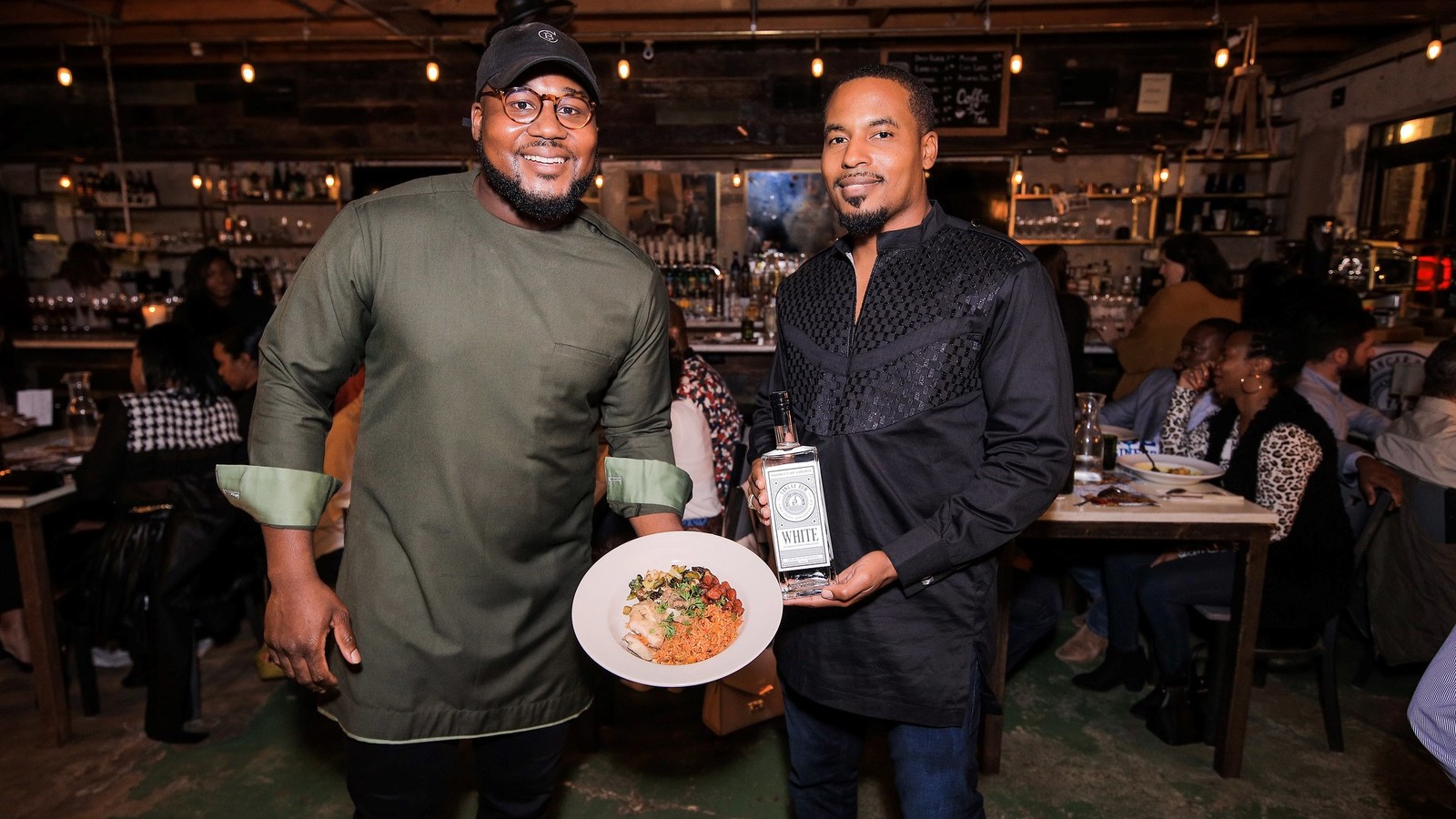
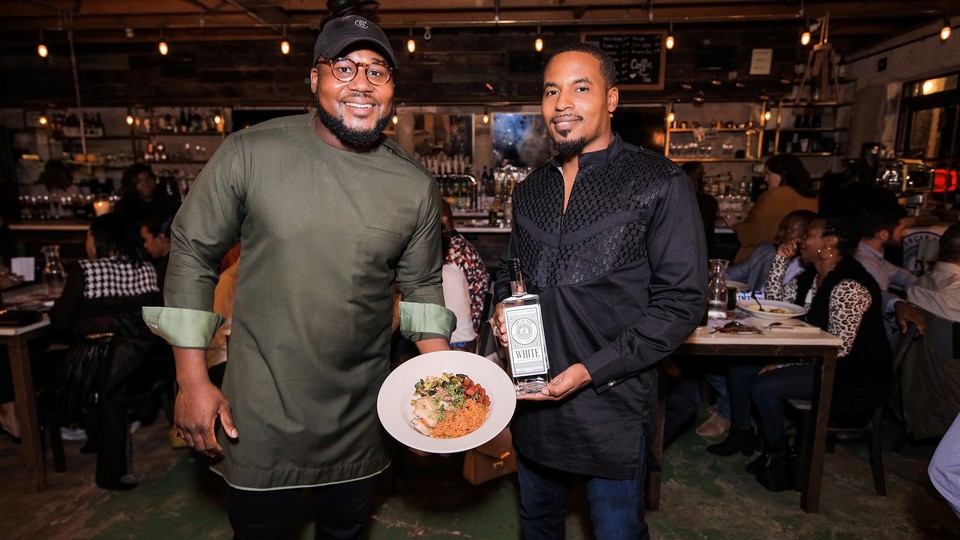
Great ideas need the right place to grow, and at Rice Business, entrepreneurs find more than inspiration — they find structure, support and a community that believes in rolling up its sleeves. Whether students arrive with a clear business plan or just a hunch that something could be better, the entrepreneurial mindset of a Rice MBA helps them build, test and launch.
From the heat of a kitchen to the frontiers of virtual reality, here are six businesses that took root at Rice Business — and are making their mark far beyond campus.
1. ChopnBlok
Founder: Opeyemi “Ope” Amosu ’14
Ope Amosu turned his passion for food and community into ChopnBlok (pronounced “choppin block”), a fast-casual restaurant that brings the vibrant flavors of West Africa to Houston. Starting with pop-up dinners and leveraging everything from pitch competitions to faculty feedback, Amosu launched his restaurant in 2021. It quickly earned acclaim — including two James Beard semifinalist nods in 2024 and 2025. Since being featured in national magazines like The New Yorker and Texas Monthly, ChopnBlok has become more than a restaurant: It’s a cultural movement centered on flavor, heritage and inclusion. Hear about Amosu’s culinary passion and entrepreneurial journey.
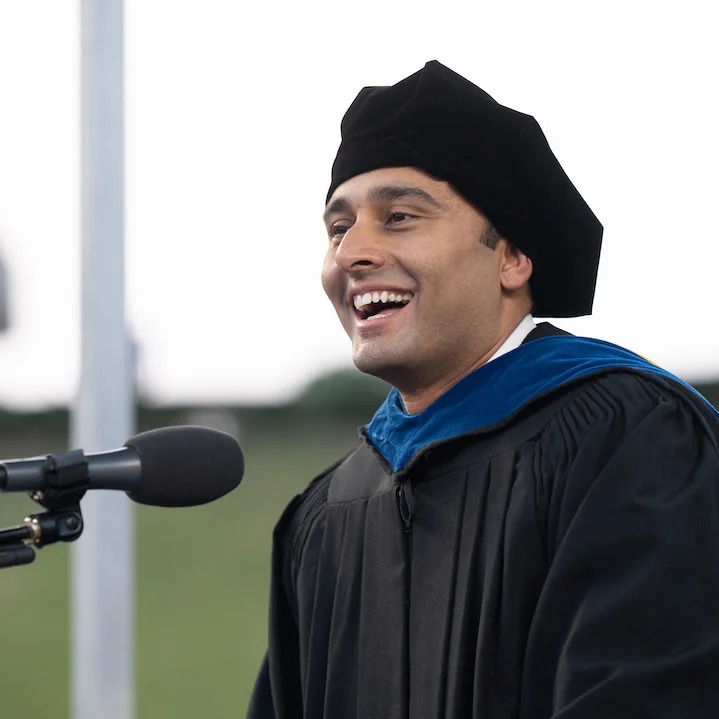
2. Cart.com
Founder: Omair Tariq ’16
When Omair Tariq co-founded Cart.com, he wanted to help brands scale without losing focus. The company offers end-to-end e-commerce infrastructure — everything from fulfillment to digital marketing — and has since grown into a leader in the space, supporting thousands of brands. Cart.com’s rapid rise reflects a core Rice Business principle: solve real problems at scale, and growth will follow. During his Rice Business commencement address in 2023, Tariq credited his MBA with shaping his systems-level thinking and preparing him to lead fast-growth teams.
Interested in Rice Business?
3. Friedkin Group
Founder: Dan Friedkin ’92
As chairman and CEO of the Friedkin Group, Dan Friedkin oversees a diverse portfolio that spans auto distribution, luxury hospitality, aviation and movie production (including award-winning films like “Killers of the Flower Moon”). Anchored by flagship companies like Gulf States Toyota and Auberge Resorts Collection, the Group also includes interests in conservation and global philanthropy — from protecting endangered wildlife to supporting education initiatives. Friedkin’s work reflects the broader vision of a Rice Business grad: building businesses that are not only profitable, but purposeful.
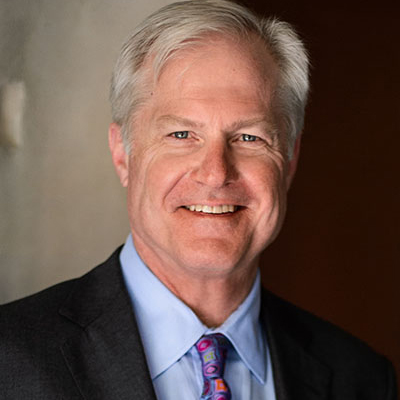
4. Sallyport Investments
Founder: Doug Foshee ’92
Doug Foshee founded Sallyport Investments after leading El Paso Corporation as CEO and building a reputation as one of the energy industry’s most thoughtful strategists. Sallyport focuses on private equity and venture capital, backing companies with strong fundamentals and the capacity to scale — particularly in energy, infrastructure and industrial tech. Foshee’s career is a study in what it means to pair business acumen with steady, values-driven leadership.
5. Virtuix
Founder: Jan Goetgeluk ’10
Jan Goetgeluk came to Rice Business with an idea and left with a company. His startup, Virtuix, created the Omni — a virtual reality treadmill that lets users walk and run in 360-degree virtual spaces. Used for gaming, fitness and military training, Virtuix is a rare example of a successful hardware venture in the VR space. What began as a niche concept for gamers quickly drew attention from investors and technologists eager to expand what immersive tech could do. Today, Virtuix is changing how people move through virtual worlds — and it all started on campus. Hear directly from Goetgeluk on Owl Have You Know as he shares his journey and experience co-founding the Rice Energy Finance Summit (REFS) as a MBA student in 2009 — and how the student-led conference continues to drive important discussions on financial factors affecting the global energy industry today.
6. 3 Men Movers
CEO: Jacky Fischer ’11
3 Men Movers began in 1985 as a one-truck operation founded by Jacky Fischer’s father, John. When she came on board in 2003, she brought fresh energy and big ideas — and a year later, she bought the company. With help from her Rice Business MBA, Fischer expanded operations beyond Houston, introduced new services like portable storage and packing, and modernized the company’s logistics and marketing. Today, 3 Men Movers has more than 100 trucks, 400 employees and locations across Texas and Florida. It’s a story of generational growth powered by entrepreneurial thinking and strategic leadership.
These six businesses are just a glimpse of how Rice Business alumni turn ideas into impact — and are supported by a community that champions innovation at every stage.
Continue reading about how our Rice MBA builds an entrepreneurial mindset and why we are recognized consistently as the #1 graduate program for entrepreneurship.
You May Also Like
Keep Exploring
Leading From Within: Spotlight on the Rice Business MAcc Student Committee
Here's a closer look at how the Rice MAcc Student Committee is making an impact.


At Rice Business, leadership isn’t just something you learn — it’s something you live. In the Master of Accounting (MAcc) program, one standout way students put leadership into action is through the MAcc Student Committee. This student-led group plays a vital role in shaping the MAcc experience, connecting peers with faculty, alumni, and industry professionals, and organizing events that foster both community and career readiness.
Here’s how the MAcc Student Committee is making a meaningful impact.
What is the MAcc Student Committee?
The MAcc Student Committee is a student-selected body that enhances the academic and professional journey of MAcc students while cultivating a strong, connected community. Composed of representatives from each cohort, the committee collaborates closely with faculty and staff to ensure the student voice is reflected in both program decisions and extracurricular offerings.
Key Areas of Impact
Community-Building and Connection
Creating a strong sense of community is especially important in an intensive, one-year program like the MAcc. The Student Committee leads initiatives that foster meaningful relationships, including:
• Welcome mixers and cohort dinners
• Group volunteer days with Houston nonprofits
• Peer-led study sessions and team-building outings
These events provide students with opportunities to connect, recharge, and support one another — helping everyone thrive both academically and socially.
“I joined the committee to help build a stronger sense of community within our cohort and create meaningful shared experiences. It was a chance to take on a leadership role, develop new relationships, and make our year together truly memorable. Being part of the committee allowed me to connect more deeply with my peers and form lasting friendships.” — Aizhan Mukhametzhanova
Academic Feedback and Advocacy
The committee also acts as a conduit between students and faculty, collecting feedback and offering suggestions to improve the academic experience. From facilitating peer study sessions to advocating for collaborative learning opportunities, the committee ensures each student has the resources and support to succeed.
“I joined the committee because I wanted to be intentional about getting involved. With the program being just one year, I knew I had a limited window to make the most of the experience and help our cohort build strong connections.” — Aramide Ogunmekan
Leading With Purpose
By serving on the MAcc Student Committee, members gain more than networking and organizational experience — they build leadership skills that translate directly to the workplace. Committee work includes project management, event planning, conflict resolution, and strategic communication — all essential skills for tomorrow’s accounting professionals.
“I’ve always valued leadership opportunities, and the MAcc Committee felt like the perfect way to grow closer to my peers while organizing events that brought energy and connection to our program.” — JJ Edmonds
A Legacy of Leadership
Each year, the MAcc Student Committee leaves behind a legacy — from launching new networking traditions to enhancing alumni engagement and social programming. These student-led initiatives enrich the program for future cohorts and ensure a continuously evolving, student-centered experience.
Being part of the committee is more than just a résumé booster — it’s a leadership opportunity that directly shapes classroom dynamics, professional outcomes, and the lifelong value of the Rice MAcc degree.
Interested in Learning More?
If you're a prospective student seeking a program where you can lead, collaborate, and grow, Rice Business offers the perfect environment to do so. Learn more about the MAcc program, attend an event, or complete our request for information form to explore how you can make your mark.
Interested in Rice Business?
Does an accounting-based career sound like it’s for you? Contact us at ricemacc@rice.edu! We would love to share more information with you about the benefits of pursuing a graduate accounting degree at Rice.
Keep Exploring
Bob Dittmar named associate dean of Rice’s Virani Undergraduate School of Business
Rice Business is pleased to announce that Bob Dittmar, the Houston Endowment Professor of Finance, has been appointed associate dean of the Virani Undergraduate School of Business, effective July 1.
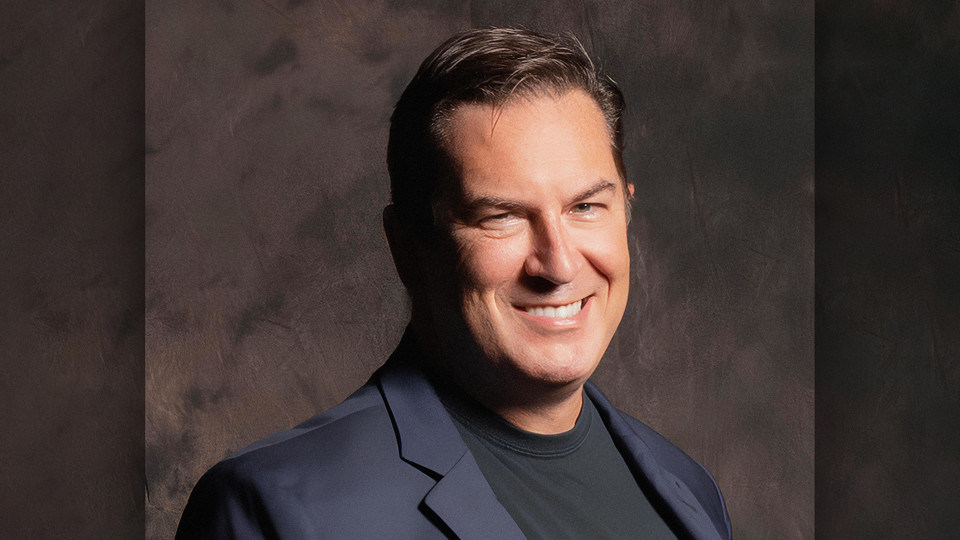
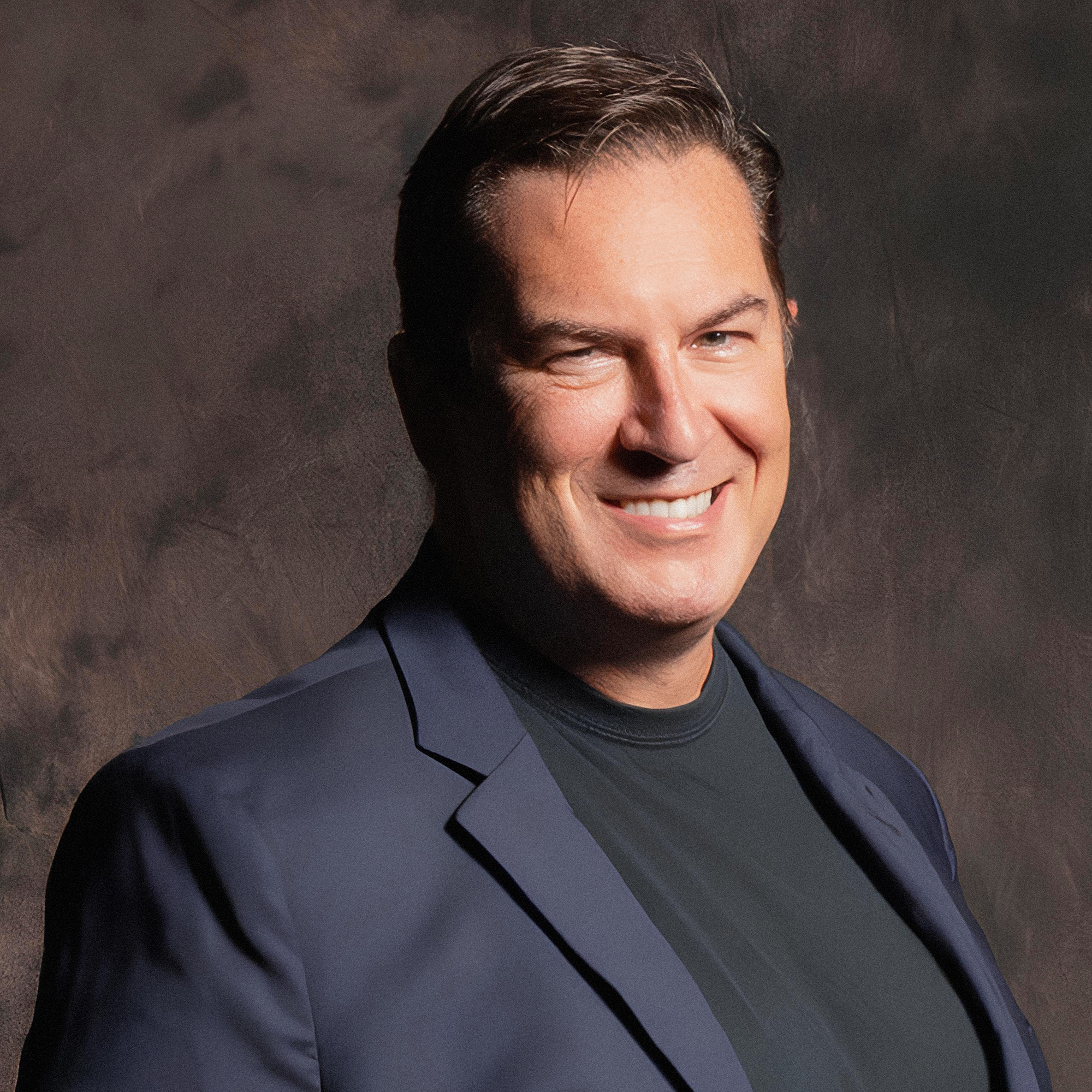
Rice Business is pleased to announce that Bob Dittmar, the Houston Endowment Professor of Finance, has been appointed associate dean of the Virani Undergraduate School of Business, effective July 1.
Dittmar, who joined Rice Business in 2023, brings a distinguished record of research, teaching and academic leadership to the new role. His work in asset pricing, financial market frictions and macrofinancial linkages has been widely published in top academic journals. Prior to Rice, he served on the faculty at the University of Michigan’s Ross School of Business.
“We’re thrilled to have Bob step into this important leadership role,” said Peter Rodriguez, dean of Rice Business. “He brings not only deep academic insight but also a clear commitment to student learning and development. As we continue building the Virani Undergraduate School of Business into one of the premier business programs in the country, Bob’s vision and collaborative style will be a tremendous asset.”
In his new role, Dittmar will oversee the strategy and operations of the undergraduate business program, guide curriculum development and foster an exceptional student experience.
“Bob is a natural fit for this position,” said James Weston, the Harmon Whittington Professor of Finance and senior associate dean of degree programs. “He understands what makes undergraduate business education meaningful in today’s economy, and he knows how to challenge students while championing their growth. I look forward to working closely with him as we shape the next phase of our undergraduate offerings.”
Dittmar is a highly regarded educator and mentor, having taught courses in asset pricing, investments and financial modeling at both the undergraduate and graduate levels. His approachable style and ability to translate complex ideas into practical insights have made him a favorite among students and colleagues alike.
“I’m honored to take on this role and help shape the undergraduate experience at Rice Business,” Dittmar said. “Our students are smart, curious and driven to make a difference. I’m excited to work with faculty, staff and the broader Rice community to continue building a program that empowers them to lead in business and beyond.”
The Virani Undergraduate School of Business, established in 2021 and named in 2024 with a transformative gift from the Farid and Asha Virani ’89 family, is one of the newest and fastest-growing business schools in the country, offering a forward-looking curriculum rooted in the values of innovation, integrity and impact.
You May Also Like

Rice University’s Jesse H. Jones Graduate School of Business today announced the launch of its Graduate Certificate in Healthcare Management program, a 10-month, credit-bearing professional credential designed for current and aspiring leaders seeking deep expertise in the business of healthcare.
Rice Business trains leaders on campus and on-site with executive programs
Rice Business Executive Education offers custom-made programs for companies that want to strengthen leadership, enhance culture or address specific management challenges or organizational opportunities.
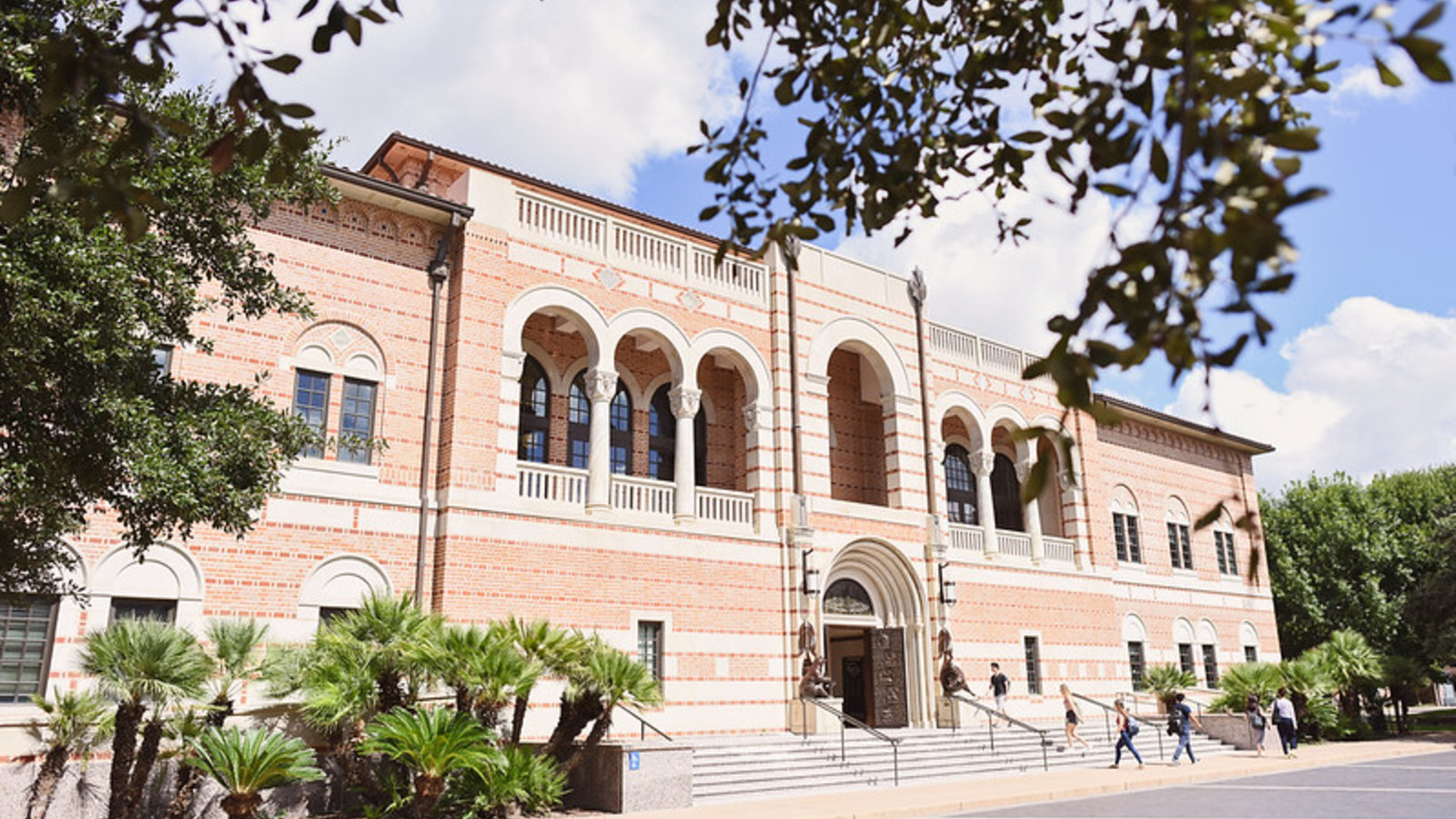
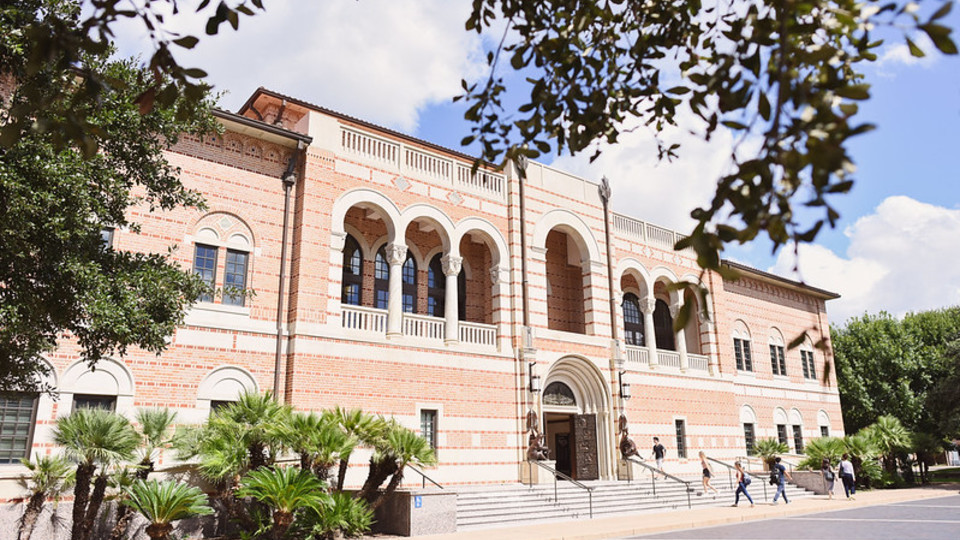
Rice Business Executive Education offers custom-made programs for companies that want to strengthen leadership, enhance culture or address specific management challenges or organizational opportunities. Phillips 66 leaders approached the Executive Education team to develop a custom program focused on leadership, strategy, change management and financial decision-making.
“We’ve got a talent program … we’ve got a collaborative agreement with Rice University where we’re taking our best and brightest and making future leaders of them,” said Mark Lashier, chairman and CEO of Phillips 66, in an interview with Bloomberg.
The team at Rice Business led by Brent Smith, senior associate dean for Executive Education, developed the two-week development program over the course of several months, combining academic expertise with real-world experience and application. Smith has taught more than 300 executive programs around the globe for companies including ExxonMobil, IBM, HSBC, Credit Suisse, Saudi Aramco, DeBeers, Goldman Sachs, Microsoft, Citibank and Red Bull. He served as leadership faculty for the corporate universities of TOTALEnergies, Lufthansa, Tenaris, NOV and Eaton Corp. and is a founding board member of the University of Texas MD Anderson Cancer Center Leadership Institute.
“We so appreciate the perspective Phillips 66 brought to our partnership,” Smith said. “They gave us the time, access to their executives and the resources needed to properly design a program that marries the expertise of our faculty with the challenges and opportunities at Phillips 66. Their willingness to invest in their people is a testament to the culture they have built and continue to cultivate. While companies say their people are their most important asset, the resources Phillips 66 puts into development demonstrates their belief in that statement.”
“Brent and the team at Rice have been so wonderful to work with,” said Meredith Lewis, director of the learning and development programs at Phillips 66. “We partnered on an extensive needs-analysis to create something really uniquely suited to address our challenges and support our business strategy. The customization they were able to provide makes the program relevant and far more impactful than off-the-shelf leadership development.”
Rice Business builds strong relationships with stakeholders to create a truly customized learning experience by taking the time to understand the organization’s structure, challenges and goals. This foundation helps design a program that not only aligns with management needs but also delivers meaningful impact to employees.
Executive Education faculty work closely with stakeholders to help create the program, blending academic insight with practical application through engaging methods like case studies, simulations and team-based projects. Whether the program takes place on the Rice campus or on-site at an organization, Executive Education programming focuses on creating an environment that supports dynamic learning.
Rice Business faculty are known around the world for their academic and research achievements — their blended teaching methods create a highly engaged classroom and rich learning environment. Custom topics range from the latest insights in leadership and strategy to data-driven decision-making and artificial intelligence.
To learn more about Rice Business Executive Education programs for teams and individuals, click here.
You May Also Like

Rice University’s Jesse H. Jones Graduate School of Business today announced the launch of its Graduate Certificate in Healthcare Management program, a 10-month, credit-bearing professional credential designed for current and aspiring leaders seeking deep expertise in the business of healthcare.
‘Here to work with the world’: Rice shines at inaugural SXSW London
Rice University took center stage at the inaugural South by Southwest London, bringing Texas-sized ambition, pathbreaking innovation and global vision to one of the world’s premier gatherings of creative and intellectual leaders.
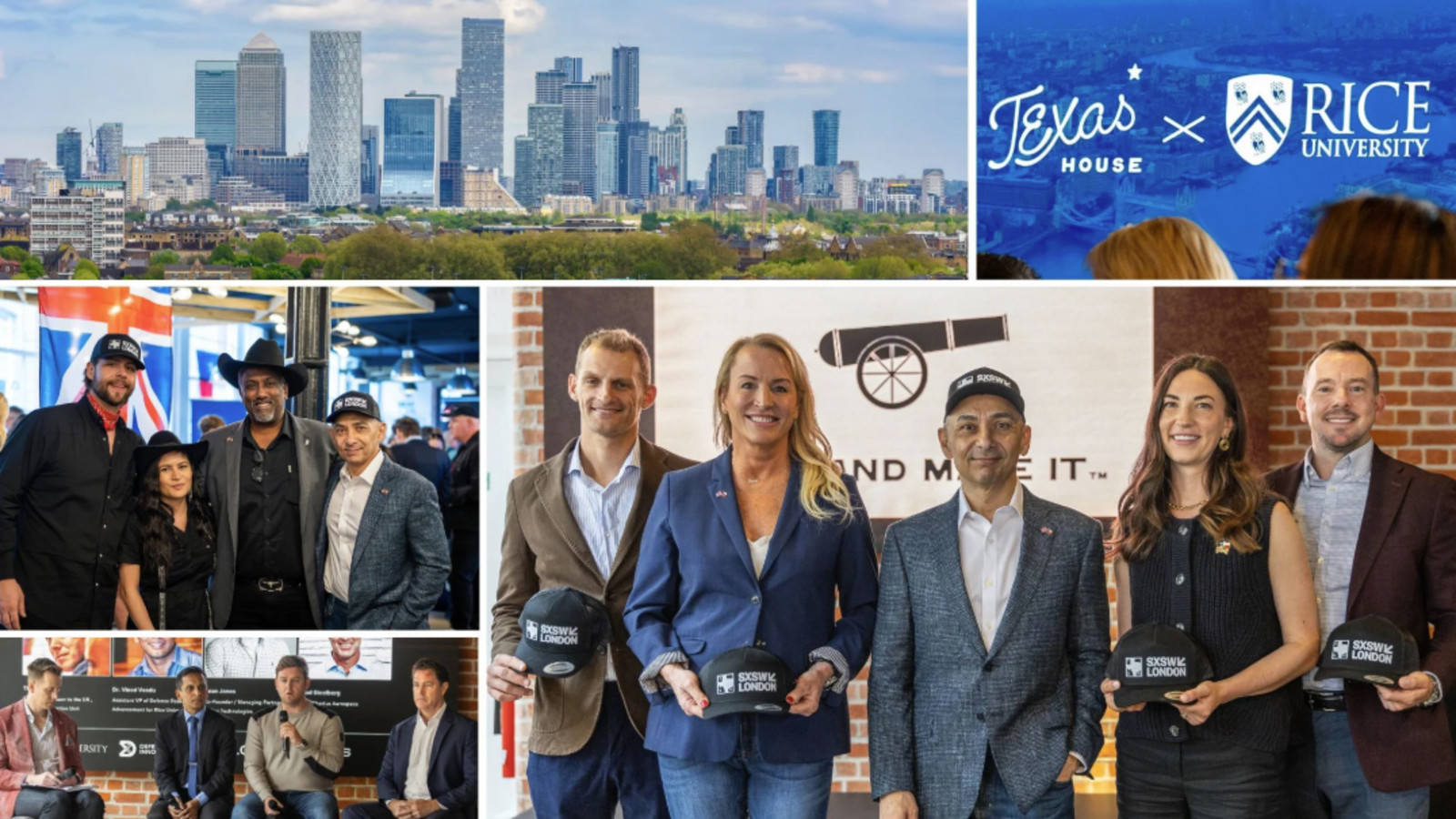
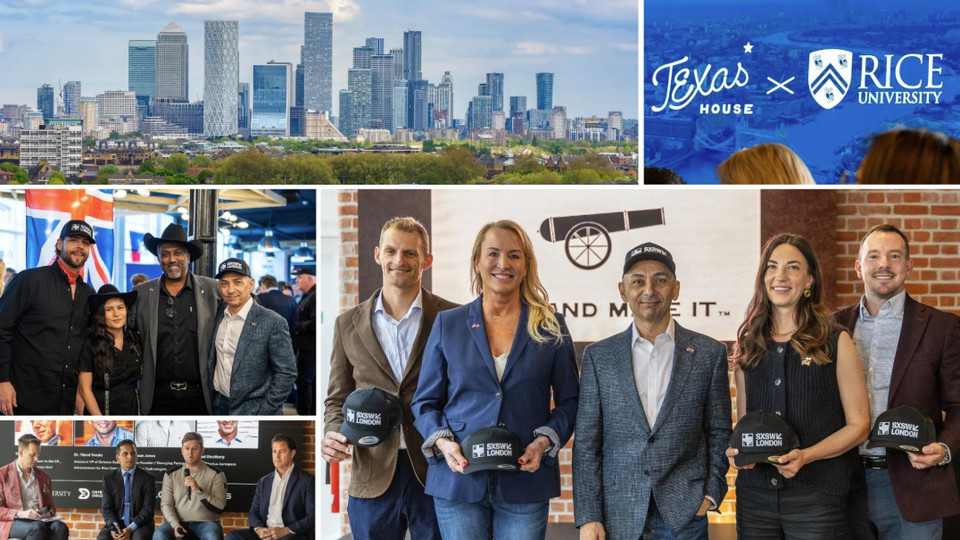
Rice University took center stage at the inaugural South by Southwest London, bringing Texas-sized ambition, pathbreaking innovation and global vision to one of the world’s premier gatherings of creative and intellectual leaders. As part of Texas House in the heart of Shoreditch, East London, several Rice leaders spoke on panels and delivered talks showcasing not only the university’s strength in business and innovation but also its deepening impact in Europe and beyond.
Chief innovation officer Paul Cherukuri laid out a bold vision for the future of innovation, positioning Rice as a driving force in discovery and impact.
“Higher education is really under a huge lens now,” Cherukuri said. “What we see is an opportunity — an opportunity to reinvent what higher education really means. And that’s what we’re doing in Texas.”
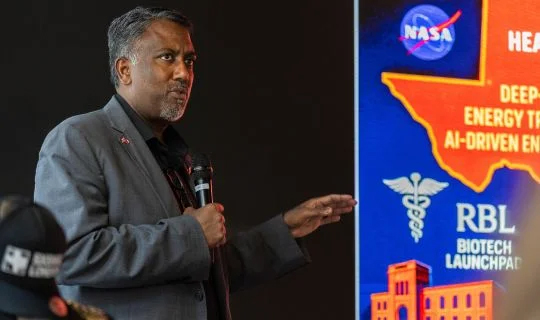
From cutting-edge biotech commercialization to global partnerships, Cherukuri emphasized that Rice is not just keeping pace — it’s setting the speed of innovation. “We’re wanting you all to know that Rice is actually engaged, not only in Houston, Texas, but globally. We are a global university. We bring the world to Houston.”
That engagement is evident in initiatives like the Biotech Launch Pad and RBL LLC, aimed at accelerating the commercialization of biotech inventions, as well as the Ion , Rice’s flagship innovation hub at the heart of Houston’s growing innovation district.
Cherukuri underscored Rice’s commitment to bridging the gap between research and real-world impact. “We’re taking it into the real world and commercializing it,” he said. “What we’re doing is to try to have an impact. When we create an invention, if we do not release it to the world … it is actually our responsibility to do so. By not doing so is actually a disservice to society.”
One of the university’s most ambitious moves is a partnership with Woodside Energy, launched in January 2024, to create the Woodside-Rice Decarbonization Accelerator. The five-year collaboration aims to bring advanced, lower-carbon technologies to market starting with plasma-based material innovations.
“The Woodside project is really unique, and the reason it’s unique is plasma,” Cherukuri explained. “This is a new technology, a new capability in being able to make materials. It’s the absolute cutting edge. It’s opening up new avenues — not only to create new materials but new fuels, new ways of doing chemistry, cleaner and cheaper and hopefully at scale.”
At the heart of Cherukuri’s message was a clear call to collaboration. “We are here to work with the world. That is the point of why we are here. We want to show that we are here to partner. We want to meet like-minded individuals who have the same philosophy: to change the world in terms of invention, innovation and impact.”
He also reminded the audience that Rice’s legacy of discovery is no accident. “It’s a remarkable institution,” Cherukuri said. “Anybody who steps foot in the halls of this incredible place can see that the DNA inside here is to think, to dream big, to think big, to really do things at a scale that no other university can do. And we have that wonderful charter — and we’ve done that time and time again.”
Come and make it: Building bilateral trade with the Lone Star State
Peter Rodriguez, dean of Rice Business, shared timely insights into why Texas — and Rice itself — are uniquely positioned to lead in global trade and economic collaboration.
“There are a lot of reasons,” Rodriguez said when asked why Texas continues to attract international business. “You need to think of an economy — eighth largest in the world, 30 million people, a geographic footprint larger than France. Let’s just say it’s an enormous place.” But beyond size, he emphasized, the real draw is Texas’s momentum: “Growth is the environment in which you want to invest. We see that in Texas in a very big way. About 1,100 people per day move to Texas.”
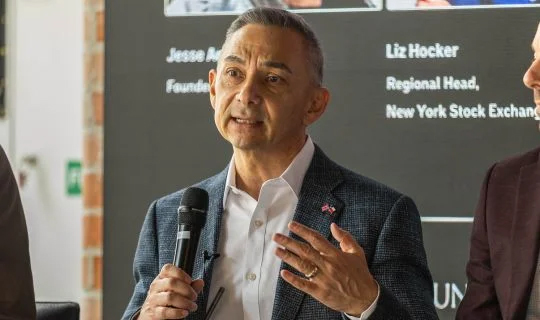
Rodriguez pointed to the state’s unmatched energy resources — “the No. 1 energy producer and exporter in the country” — as well as its growing renewable sector, diverse population and business-friendly climate.
“It’s a city of diversity because it’s a city of great opportunity. You can come there, and if you can build it, there is no barrier to anyone,” he said of Houston.
But for Rodriguez and Rice, the future of business and education doesn’t stop at Texas’s borders. “We call ourselves ‘Moonshot University.’ This is where big dreams are launched,” he said, referencing President John F. Kennedy’s famous 1962 moon speech delivered at Rice Stadium. “We realize you can’t do that — have impact — without great connectivity to the world.”
Rodriguez described Rice’s growing international presence, including its new center in Paris and presence in India. “We don’t need to be everywhere. We need friends everywhere. We need relationships everywhere,” he said. “That’s what’s going to make our university stronger: creating research partnerships with universities, bringing in top students and delivering top students back out to those universities.”
Innovation, Rodriguez explained, is central to both Rice’s mission and Texas’s economic future. “We run the world’s largest business plan competition at a university,” he said. Each year, tech-based entrepreneurs compete in areas like digital health, artificial intelligence and energy transition. “We want to bring together smart minds working at the vanguard of their technological fields and commercializing those ideas into something that makes a really positive difference.”
The key to turning ideas into impact? Collaboration. “It takes city leaders. It takes governments. It takes universities, and it takes corporations working together,” Rodriguez said. “We want to create the friendliest ecosystem for doing that.”
At Rice Business, that collaborative spirit starts early. “Every student has a chance to run a startup,” he said. “Every student has a chance to work with technologists, engineers and natural scientists to develop an idea, take it further and see if they can make a big difference.”
As Rodriguez sees it, Texas is a place that embraces risk and rewards ambition — and Rice is at the center of that energy, helping shape the next generation of global leaders and innovators.
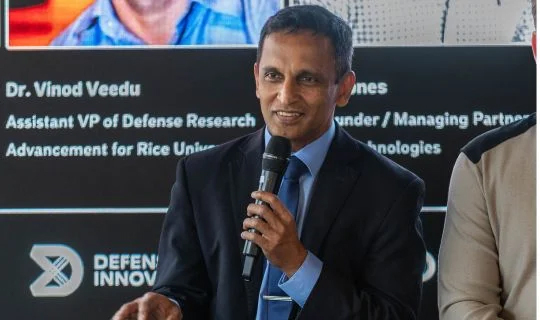
Vinod Veedu, assistant vice president for defense research advancement at Rice, took part in a panel focused on the vital U.S.-U.K. partnership in driving innovation across defense, business and capital investment. The discussion emphasized that close collaboration between the two nations accelerates technological advancement, bolsters both commercial and defense sectors and reinforces shared security objectives.
In March, Rice served as the educational partner for the inaugural Texas House during SXSW in Austin. A first-of-its-kind unofficial, off-site activation, Texas House brought together thousands of attendees to celebrate “Texcellence” — showcasing the bold ideas, pioneering spirit and world-class collaborations that define Texas’ forward-thinking vision.
As a key sponsor, Rice experts led dynamic panel discussions on topics including global partnerships, innovation in Texas, national security and supply chain connectivity, the development of collaborative life science centers and Texas’ role in the emerging brain economy.
You May Also Like

Rice University’s Jesse H. Jones Graduate School of Business today announced the launch of its Graduate Certificate in Healthcare Management program, a 10-month, credit-bearing professional credential designed for current and aspiring leaders seeking deep expertise in the business of healthcare.
Transforming AI Literacy in the Classroom feat. Corey Layne Crouch ’13
Season 5, Episode 9
Corey chats about her pivots from pre-med to English to her current role as an EdTech executive — as well as the importance of supporting AI literacy and how she's helping transform the education system.
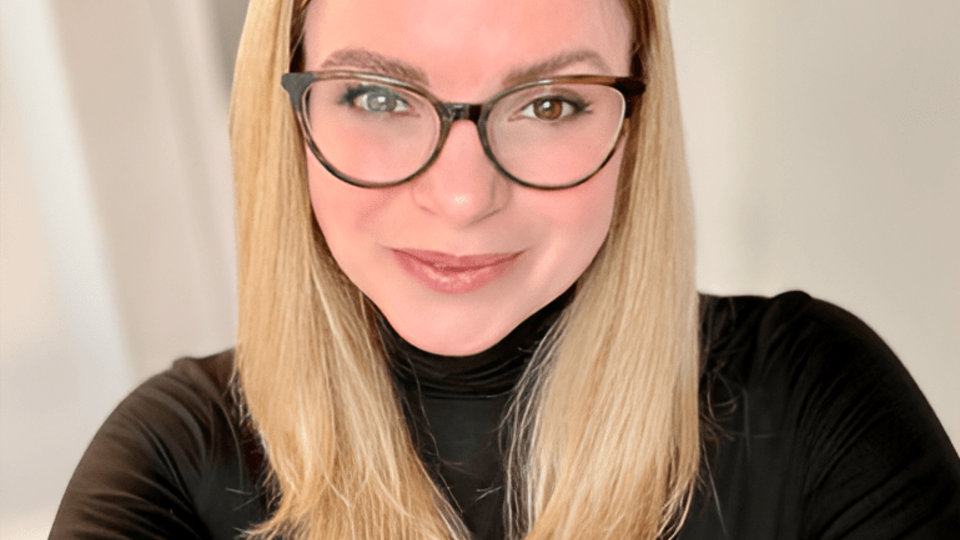
Owl Have You Know
Season 5, Episode 9
Despite entering college as a pre-med major, Corey Layne Crouch ’13 found her calling in the classroom after working as a teacher’s aide for a kindergarten class. Switching majors, she set out on a path to transform the education system from within.
Corey’s entrepreneurial mindset in her work as a high school English teacher and school principal led her to Rice’s Professional MBA program. Now, she’s the chief program officer for AI for Education — an organization providing AI literacy training to educators and championing responsible use of AI in the education ecosystem.
In this episode, Corey joins host Maya Pomroy ’22 to chat about her pivots from pre-med to English to her current role as an educational tech executive — as well as her time at Rice Business, the importance of supporting AI literacy and the innovative ways she’s influenced the education system.
Subscribe to Owl Have You Know on Apple Podcasts, Spotify or wherever you find your favorite podcasts.
Episode Transcript
-
[00:00]Maya Pomroy: Welcome to Owl Have You Know, a podcast from Rice Business. This episode is part of our Flight Path Series, where guests share their career journeys and the stories of the Rice connections that got them where they are.
From high school principal to an education tech executive, Corey Lane Crouch has spent decades leading schools, school district teams, and inspiring every student in her classroom. As AI is becoming more intertwined in every aspect of our lives, including education, Corey recognized an opportunity to use and integrate new innovation in making an impact on the next generation of leaders. We talked with her about how she pivoted from a pre-med track to teaching kindergarten to being a student herself at Rice Business. We also talk about her new role leveraging AI and building a more equitable future for all students.
Welcome to Owl Have You Know. I’m Maya Pomroy, your host. And our guest today is Corey Lane Crouch, Professional MBA from the Class of 2013.
Welcome, Corey!
[01:05]Corey Lane Crouch: Thanks, Maya. I'm so happy to be here.
[01:08]Maya Pomroy: Well, we're thrilled to have you. You know, it's been a hot minute since you've been in Houston and at Rice. You've been up to quite a bit, and I'm so looking forward to talking with you about your story and your career pivots and the real dynamic industry that you are currently in, which is on the forefront of everybody's mind.
So, you were a former high school English teacher. You were a principal. And now, you are an educational tech executive. You are the chief program officer at AI for Education, which is something that I am very much intertwined with because I have children and they use a lot of AI in school right now. So, having this opportunity to talk with you about it, I think that a lot of parents and even those that are in the AI space are curious about your journey.
[01:59]Corey Lane Crouch: Great! Yeah. Well, I'm excited to talk about all that. And now, I'm really curious to know what you're seeing in your children and their experience with AI as they move through their education journeys.
[02:12]Maya Pomroy: We will get to that before [crosstalk 02:13].
[02:12]Corey Lane Crouch: Well, yes, we will.
[02:15]Maya Pomroy: Actually, you started out as a pre-med major at NYU.
[02:21]Corey Lane Crouch: That's true.
[02:22]Maya Pomroy: I mean, tell me, so, from that education, that's a shift.
[02:26]Corey Lane Crouch: Yeah. You know, I was always proud to be a good student. And I'm a lifelong learner. That's really a thread that goes through my story. And, you know, graduating from high school, I wanted to go to a fun, exciting, honestly, hard-to-get-into school. And so, when I was accepted to NYU, I was like, “Okay, great. Not going to think about anything else.” And I'm going to go there pre med, but also an English literature major, because I've always loved reading and writing and literature.
And when I was there, you know, I had my chem lab on Wednesday mornings. I still remember that. I remember dragging myself to the chem lab and, like, you know, being surrounded by all these other students who were, of course, brilliant but, like, you know, very focused on everybody getting the highest grade, which I understood.
[03:24]Maya Pomroy: Gunners. Those are called gunners, right?
[03:25]Corey Lane Crouch: Yes. Well, I'm still very much a recovering perfectionist. And I was, you know, dragging myself to those classes, but I also had the opportunity to get a work study job through… at the time it was called the America Reads program. And so, what I did for work while at NYU is that I was a teacher's aide in the kindergarten classroom in the Lower East Side. My week started to really shift because I realized how much I enjoyed being in that classroom with the teacher and with the students. I'm pretty sure I worked more hours than I was supposed to.
[04:07]Maya Pomroy: Well, that means that you have a passion for it, you know. And work isn't work, then that's passion.
[04:12]Corey Lane Crouch: Yeah. So, I certainly realized I had some reflections and some moments. NYU is an expensive… it was an expensive school 20 years ago. It's still an expensive school. And I realized, you know, maybe pursuing education is more where my passion is. And so, that took me to actually transferring to Rowan University here in New Jersey and becoming an elementary education and English literature major.
[04:42]Maya Pomroy: Wow. So, it was just that opportunity, that job, that you didn't think was going to shift anything and really just completely transformed your future.
[04:53]Corey Lane Crouch: It really did. It really did.
[04:55]Maya Pomroy: It's those unexpected moments, huh?
[04:56]Corey Lane Crouch: Well, yes, very unexpected. But then, you know, I was like, New York City. I love New York City. I'm a city girl. I was an elementary education major. Was getting ready to graduate and some other friends had talked about the Teach For America Program, which wasn't really very big at the school that I had transferred to, Rowan University. But I was like, “The mission speaks to me. Let me go ahead and apply.”
[05:23]Maya Pomroy: Could you tell us a bit about… because I know what it is, but for the listeners that don't, could you tell us about Teach For America?
[05:29]Corey Lane Crouch: Yes. Teach For America is a teaching corps, where, at the time, it was really targeted toward those graduating from college. And you apply to be a part of a corps that would go to an area that really needs teaching talent for at least two years and become a part, and then you would do training. And, you know, the idea of it is, like, to serve the population, you know, with a teaching talent, but also understand education. And then, if you go off to other careers and other industries of bringing that knowledge in order to continue to advocate for some of the changes that we saw that we needed at the time and still need now.
Well, the funny thing, Maya, is I was elementary. So, sure I was going to New York City. I got my placement, and it said high school English in Houston, Texas. Had never been to Texas, didn't know anything about Houston, you know. I'd actually called the Teach For America team and told them that I thought that they had made a mistake. I was like, “I think you made a mistake. Supposed to be an elementary in New York City.” And they were like…
[06:38]Maya Pomroy: “And now, I'm in high school in Texas, Houston?”
[06:41]Corey Lane Crouch: They were like, “No, you're qualified to TN. You said you would be willing to go to Houston,” which I think I said I would be willing to go places.
[06:49]Maya Pomroy: Go anywhere, yeah.
[06:50]Corey Lane Crouch: But that was the next big pivot. But really, I see it as, you know, such a serendipitous blessing because being, you know, fresh out of college and I did, I went to teach high school English in Houston and I was like, “Well, I have no idea what to expect.”
At the time, it was Sam Houston High School in the north side of Houston. I think it is now… the name has changed. But yeah, Houston is such a great city. As you know, to be a young professional in and to start your career, let alone having the opportunity to be a part of the thriving, innovative education landscape there, I really think that it helped me think much bigger about what it meant to be an education and what was possible with innovation and really moving the needle toward equity and supporting communities that, historically, you know, weren't being serviced in the way that they deserved.
[07:52]Maya Pomroy: Right. So, how many years were you in Houston teaching high school English?
[07:56]Corey Lane Crouch: So, I taught high school English for, first, I taught for two years, and then I actually joined the Teach For America team for a few years in Houston and trained pre-service teachers in that role for several years. And then I went back into the classroom with a Houston-based charter network called YES Prep. So, if our listeners are in Houston, they probably know YES Prep. And went back to the classroom and was both doing instructional coaching and teaching for several more years until I became the school principal when we opened the high school.
[08:36]Maya Pomroy: Wow. You're a very young principal.
[08:40]Corey Lane Crouch: Maya, I was like, “This is going to come up.” I stepped into that role while I was in the MBAP program at the same time.
[08:52]Maya Pomroy: Well, wow, that's a lot on your plate. So, wait, let's back up a little bit. So, you're teaching in HISD and YES Prep. And then, so, what was the catalyst? What made you decide, “You know what? I'm going to go get an MBA at Rice.”
[09:08]Corey Lane Crouch: Yeah, so, I had shifted from, you know, HISD to Teach For America and then back to YES. And I realized now and more as I was going, I always had a really entrepreneurial spirit. Like, even in my first year of teaching, I was a baby, you know, 22-year-old teacher. I still chuckle at myself. And I pitched, like, a new summer program for credit recovery for the high school students at my school. And my principal at the time let me do it, which is also…
[09:38]Maya Pomroy: Well, that's great to have somebody that believes in you and gives you the agency to do things like that. That says a lot about their faith and trust in you, you know.
[09:46]Corey Lane Crouch: Yeah, absolutely. Yeah. And I've had so many incredible supports along the way. But I realized that, in every role I was in, I was always coming up with, really, intrapreneurship, right? Coming up with new programs, new designs to solve problems or opportunities that I was seeing in the work that I was doing.
[10:08]Maya Pomroy: What were some of the problems that you saw? I'm curious. Like, what were some of the programs that you started?
[10:13]Corey Lane Crouch: Well, for example, when I was at YES Prep, which was in the Gulfton neighborhood — shout out to my Force family. We were the Gulfton force. As a school leader, I brought in house the local clinic called Legacy where they provided mental and behavioral health services, as well as, you know, physical health services, and created a space on our campus to have a mental health specialist and then also a nurse practitioner. And so, we started a partnership with Legacy so that my students, if something was going on with them or they needed extra support that, you know, our school counselors weren't equipped to give that regular clinical support, they could just come, you know, from their study hall or have an appointment once a week with somebody in house. So, it supported, you know, their parents didn't have to necessarily take them to separate appointments. And it just kept a lot more of our students on campus with us and really took a, like, whole child approach.
[11:25]Maya Pomroy: Yeah. And so much efficiency. And you were so ahead of your time.
[11:29]Corey Lane Crouch: Yeah. And while I'm doing all that, I was like, “I heard about this Rice educational entrepreneurship program. Maybe I should apply to that, too.”
[11:39]Maya Pomroy: Why not?
[11:39]Corey Lane Crouch: Cause why not? But I think, you know, I started to recognize how I always think about impact and I loved teaching and I still. You know, my colleagues will tell you every once in a while, I'm like, “Maybe I should just go back to teaching high school English because I love it so, so much.” But I was always seeing the opportunity for impact, opportunity to help others shape and navigate toward, especially for our students, a future that felt where they had agency, you know, and where they could fill their own potential and be fulfilled. So, as much as I loved being in the classroom, it was hard.
And it's also when you have 1,000 students and 100 staff members and you're very community-oriented and community-based, which I believe in deeply, especially that change should come from the community. It's hard to feel like you want to meet the needs and the desires of 1,100 people through, you know, only 24 hours in a day.
So, that work was rewarding but very difficult. But still, you know, I always saw the opportunity for impact and seeing what structures in education still serve us — us being the collective community — and what structures aren't serving us, and how can we continue to evolve and, you know, innovate and grow so that we're doing better by more students. And so, I always the next thing in mind as we were going.
[13:27]Maya Pomroy: So, tell me about the Rice program, because it was something that, obviously, drew you in. And juggling and managing a pretty rigorous career with school, that's a challenge. So, tell me about your time at Rice.
[13:42]Corey Lane Crouch: To say the least, it was a time in my life when I remember thinking like, “If I can do this, I can do anything,” you know, because it was my first year at Rice when I was, like, the assistant school director first for six months and then some things had changed in our organization where I became fully, you know… the way that my brain interpreted it was by myself, you know, principal, we call it a school director at the time. And I remember feeling a shift, like, during the day, at work, I was the person that was, really, the way I think of it, taking care of my school and my community and my employees and trying to make sure that we're making the most of the time, you know, talent, and money that we have available to us to serve the students and their families and the community.
And I was so thankful for the nights, this might sound weird to some people, for the nights that I had class, because I knew it was, like, nope, 4:30, have to be in the car.
[14:58]Maya Pomroy: Unplug.
[14:59]Corey Lane Crouch: Yes, unplug the school director Corey, and I get to put on my learner and my student hat. And I'm a learner at heart and a student. And I felt like, as intellectually as rigorous as being in class was, it was still the time during my week where I got to sit back and learn, and in some ways, like, have somebody take care of me, like, have somebody take care of, you know, how I'm spending this time versus me having to be the one that's always shaping that for others. But the hours were long. The coursework is, certainly-
[15:37]Maya Pomroy: Rigorous.
[15:37]Corey Lane Crouch: Yes, it’s very rigorous. And so, it was certainly an intense couple of years. But it was an interesting way to balance my ebb and flow of the week, such that I think it was sustainable for me.
[15:52]Maya Pomroy: Well, it was, so, you were sitting in class and then you would go and see your students sitting in class, right? Like, that's, like, living, sort of, parallel lives to those that you were serving.
[16:03]Corey Lane Crouch: Yes. I was also honored to have one of my staff members that was also in the MBA program. It just worked out that way. And so, at graduation, we bussed some of our students to be there at graduation and for them to see the work that we had done and everything. But my graduation photo, I will forever cherish. I am smiling so bright because it was a whole section of an auditorium of my students going nuts when they called my name.
[16:42]Maya Pomroy: Oh, I love that.
[16:43]Corey Lane Crouch: And it felt, you know, as tough as that was, I felt very much that it was something we had done together as a community and that it meant something for them too.
[16:53]Maya Pomroy: And their support of you for what you have accomplished, you know, is, sort of, giving back to you the way that you were always and continue to always give back to them. That's an incredibly special moment. So, after graduation, how did you get into the ed tech space?
[17:09]Corey Lane Crouch: I remember really thinking that I deeply believed and we saw the evidence of it that we were helping and supporting students and beating the odds, if you will. And all of our students were accepted to a four-year…
[17:26]Maya Pomroy: I read that. 100% got accepted to four-year college. That's huge.
[17:30]Corey Lane Crouch: Which in that, you know, in the Gulfton neighborhood at the time, that far outpaced the average. So, that was deeply important to me, but I knew we were helping them beat the odds but we weren't changing the odds.
And I remember just kept thinking to myself, “There's got to be a different way to have an impact on the way the system works, so that more, like, we change the odds, more students have access to an educational experience that gives them the option to go to a four-year college or university, if they want it, or give them the option to take another post-secondary pathway if they want it.” And then life things were going on as well, as they do, that was requiring me to move away from Houston. And so, I had some colleagues that had actually started to work with a program called Summit Learning out of Summit Public Schools in California.
And what I saw was that it was a program that was asking this question of, what should school design look like? And what should a school model look like based on what we know about learning and the learning science and best practices that's rooted in the community? And then how can technology support and make that happen in a way that-
[18:55]Maya Pomroy: [crosstalk 18:55].
[18:56]Corey Lane Crouch: Right, that was, like, never possible before. And I was like, “Yes, that is the type of thing that we should be exploring and pushing and really asking that question,” not just, you know, how great can technology be, or how far can it take us? Yes, that's something for society collectively, but this question of, how do we really service the outcomes of all students and really keep the vision for a school and a school design in mind and use technology as a tool to help us achieve that in, quite frankly, like, a system that's still pretty archaic, like, a lot of the constraints in education.
[19:43]Maya Pomroy: Based on districts and, you know, so many different variables.
[19:48]Corey Lane Crouch: So many different variables. So, that took me to being a part of Summit Learning that we eventually spun off to become our own nonprofit, which is now called Gradient Learning. And that was really my entryway into the ed tech space.
[20:06]Maya Pomroy: So, this was the time… because I remember this was the time when AI was just starting to become, you know, relevant. And for me, I feel like it was during that COVID time that it really started for our family anyway, just started to gain a whole lot of traction when, you know, the kids started going back into the classroom when classrooms were open again. And all of a sudden, you've got, like, Flint AI and all of these different platforms that kids could use, and even, you know, obviously ChatGPT and everything else. And now, it's really ingrained in everything. It's ingrained in every curriculum, it seems like, and in every teacher's learning plan and all that. For me, it, sort of, seems like it happened overnight. For you, it doesn't.
[20:55]Corey Lane Crouch: You know, yes and no, Maya. So, ChatGPT was released to the public in November of 2022. It was the fastest-growing consumer technology that we've ever seen before. And interestingly, it, in November 2022, grew a ton during that next spring, and then took a dip, the users took a dip in May and June. at first, those in the tech were like, “Oh, okay, is it cooling off this quickly?”
But we in education know what happened. That's when school let out. That's when school let out. And even recently, OpenAI released something. But what we saw very quickly is that students and teachers, even before all of the other ed tech layer products, we call them, so those are products, like you mentioned, Flint and MagicSchool and SchoolAI, those types of products, their user interfaces built on top of the frontier models like ChatGPT and Gemini and Claude.
But even before startups were launching those products, students and teachers were using ChatGPT in teaching and learning. And so, it was, kind of, all of a sudden. But at the same it's interesting to hear you say that, it's pretty integrated, because it is highly used, especially amongst students, but the work that we're doing, what we're seeing is that, by and large, especially in K-12 education, understanding how to integrate it responsibly in a way that really supports the learning and the development of students and prepares them for a future where the technology is going to be in everything that they do and supporting teachers that are trying to build the bridge from, well, pre-November 2022, this is how I would assess my students, you know, this is what my curriculum looked like, and now all of a sudden they have this technology in their pockets, really, that is like a magic essay button, you know, for all intents and purposes. What does that mean for how we need to evolve our practice? And that's a lot for teachers and school leaders and district leaders to think about while they're still running schools at the same time.
[23:33]Maya Pomroy: Yeah. Well, that's what I was going to ask, was that, you know, I'm sure that you've got a really good lens on how teachers are responding to it. Because I think that, for some teachers, you know, it's literally like walking on Mars. It's like, “I don't really know how I'm supposed to do this. And this is not what I'm…” you know, teachers that have been teaching for decades, then all of a sudden, it's like, “Well, here's this wonderful tool and you need to learn how to use it because this is the future.” So, how do you manage that?
[24:01]Corey Lane Crouch: Well, the thing that we saw early on is that, and of course, with any innovation, you have the innovation curve. So, you have your very early adopters and et cetera. So, we have… there's some teachers and some leaders that have been at the forefront of this for almost two years now. But overwhelmingly, a lot of practitioners, so the teachers and the leaders, their first encounter with it was realizing that students were using it to do their work in ways that weren't aligned with academic integrity.
[24:42]Maya Pomroy: I’m going to bring that up, too.
[24:44]Corey Lane Crouch: “AI is a cheating tool,” is a narrative that we really have to address head-on and then work to shift it. And the students tell me, too. I have the privilege and honor of, you know, doing focus groups with high school students, in particular. I was a 9th-grade English teacher. You know, I know how to get them to, like, you know, warm up and tell me what's really going on. So, they'll tell me how they cheat and, like, how not to get caught using it. And sometimes, it's like, “Well, my friend did this.” And I'm like, “Okay, your ‘friend,’…” So, for teachers and as a former, you know, English teacher, my heart goes out. I totally get it because you're already working so hard, and now you have to assess your students completely differently.
And they can't actually write a good essay with ChatGPT unless they know the content really, really well and have strong evaluation skills. So, you have to, you know, meet teachers where they are and then give them the space to be learners and explorers themselves, to build their capacity with the technology. And as educators, we naturally think like, “This is what makes sense for my students, or we have to, as a team, talk about how we're going to evolve our academic integrity policy and how we're going to evolve our assessment practices while still recognizing, you know, students have to take standardized tests. They're still going to have to write essays sometimes. But how do we, you know, continue to think bigger about the skills and the mindsets, really, that they need to be successful with the technology?”
[26:29]Maya Pomroy: So, that's one of the things, is that, for my kids, when they use AI in school, it’s not “give me the answer to this question,” which is, you know, the academic integrity issue, but more of “give me five problems about this geometry concept,” right? So, then it generates these problems, and then you can, you know, have more practice and figure out what you're getting right, what you're getting wrong, those sorts of things.
So, it took my husband and I a little while. I'm like, “Wait a second. I don't understand why you're using AI. Like, I don't. It doesn't make sense to me.” And then when we, sort of, dug a little bit deeper and the teachers were able to explain, you know, “This is about giving your child more access to more opportunities, to more practice, to build their skill set.” And, you know, that's part of it as well. So, then I was like, “Oh, okay,” because it was very hard for me to wrap my brain around how you can use ChatGPT, which immediately you think is cheating, to actually… but I mean, it's, sort of, the same way that Google was at the beginning, right? Like, you type in whatever you want on Google and there's a bazillion things that'll give you all the answers.
[27:37]Corey Lane Crouch: And calculators in the ’70s.
[27:39]Maya Pomroy: Right. That's a very good analogy.
[27:44]Corey Lane Crouch: I was not in high school math in the ’70s, but based on my research, it follows a similar curve.
[27:52]Maya Pomroy: So, those are some of those misconceptions about AI. What do you think is the biggest misconception about AI in schools?
[27:57]Corey Lane Crouch: That it's about the tooling and the technology. It's not. We feel very strongly about this, that it's about building AI literacy. It’s about, yes, understanding at a very basic level, you know, what the technology is, how it's developed, so that you can understand the capabilities and the limitations of it.
And then what we really focus on is both for educators and leaders, as well as for students, learning how to use the technology safely, ethically, and effectively. So, it's not just about, you know, how do I ask a question or get information in ChatGPT or NotebookLM or whatever tool you're using, but it's understanding the potential risks and how to keep yourself and how to keep others safe, which is data privacy and security. But it's also understanding that it's important to have a balance of human relationships and AI relationships, because we're getting more and more opportunity to have AI companions to support us in those things.
[29:14]Maya Pomroy: So, tell me some of the work that you do, because AI for education is really tackling one of the… I mean, this is one of the biggest shifts in modern learning.
[29:22]Corey Lane Crouch: Mm-hmm.
[29:23]Maya Pomroy: Right? I mean, yes, calculators in the ‘70s. This is another big, modern shift, and computers and all of those other things. So, tell me about AI for education and how you're really promoting this remarkable shift in learning and really giving all students the access, that equitable piece. Because there's some kids that don't have phones and don't have access to these sorts of AI technologies.
[29:49]Corey Lane Crouch: That's why we focus on the AI literacy piece. And we understand, because also, my change management background and understanding systems, that we need to give the time and space and resources for leaders to build their AI literacy, for teachers to build their AI literacy, for parents and caregivers to do it as well, and for students.
And so, we work with them to do exactly that — explore the tools and understand what that means for them in their immediate work and then think bigger about redesign or evolving a school program. So, we provide workshops. And the thing that we do as well is that we're tool-agnostic. We do have opinions about tools and where, you know, what's safe and what's fit for purpose and what we think isn't quite yet and how to integrate it in that way, because the technology is going to continue to evolve. But we really believe, a foundation of, which is rooted in durable skills, right, of critical thinking and evaluation and understanding the best tool for a job and how to be community-oriented, that is the work that we do. And of course, we teach people how to use the tools and drive towards outcomes with them while we're laying that foundation as well.
[31:18]Maya Pomroy: So, what kind of skills do students really need in an AI-driven world?
[31:23]Corey Lane Crouch: The million-dollar question that everybody wished they knew the answer to.
[31:29]Maya Pomroy: Well, I have a feeling you've got some suggestions and thoughts on the issue.
[31:33]Corey Lane Crouch: Well, to bring it back, I really believe that students need entrepreneurial skills. And not necessarily because every student is going to go off and start their own business, per se, but at the root of it, entrepreneurial skills is about, you know, understanding what you're trying to drive to or what's the job to be done. Seeing what's the diagnosis, what are the challenges, or, you know, opportunities to do better, and then understanding the resources that you have, and moving forward with strategy, as if it's a puzzle piece. And, you know, it's strategy but it's also about just seeing that opportunity and having the confidence and the belief in your own critical thinking, your own resourcefulness, and your ability to collaborate and build a relationship with others in order to solve a problem or drive something forward.
And the reason why I say those entrepreneurial skills, many reasons, but also, I mean, next week I'm working with a group of pre-K3 and pre-K4 teachers. Their students are going to be graduating high school in 2039 and then doing post-secondary. They're going into a workforce that we have no idea what it's going to look like. But what we do know is that, as things evolve, their ability to see opportunity and believe that they can, you know, drive toward that and that they can learn and adjust and use the tools available to them to get to that end point, that's going to be the thing that allows them to continuously have agency over the path that they take.
[33:24]Maya Pomroy: So, the time that you've been at this remarkable organization, what sort of feedback have you gotten? Because you said that you do workshops with teachers and, you know. So, what kind of feedback do you usually get, you know? I mean, people know that the train has left the station and either you, like, get on a raft and get out to the train or you've missed the train. Not a raft. On a scooter.
[33:46]Corey Lane Crouch: You know, we work really hard to be pragmatic. We're both not overly optimistic about where the technology is headed, but we're not pessimists, either. We are pragmatic. We say, “Look, it's here and it is a change. Let us meet you where you are to build some valuable skills.”
So, while I believe schools and classrooms need to evolve pretty drastically to continue to make sure our young people have agency in the workforce in the future, there's also just tools and resources we can give teachers that are going to help them in their practice in the immediate. We just need 90 minutes with them. It doesn't matter if they never touched ChatGPT before, they can walk out with some practical tools that are then going to go and enhance their practice moving forward.
And that's the feedback we get. People always come in a little… well, not everybody comes in hesitant, but for those that come in hesitant, or for those that are, like, “I'm a first grade teacher, this doesn't apply to me,” we're able to demystify it and open their eyes to possibility and the reality of why it's complicated for them as current teachers to integrate this in a responsible way.
[35:11]Maya Pomroy: So, what are you the most hopeful of and looking forward to in education in the next, you know, five years because of AI?
[35:20]Corey Lane Crouch: Well, I'll say two things. For young people, and you'll notice I refer to students as young people often, they are so brilliant and so motivated, you know, to solve for the things that are impacting their communities and their lives that we've already really seen how access to these tools can help them be even more self-directed in having an impact. We do something called a Prompt-a-Thon where groups of high schoolers come together over the course of a day and solve a problem in their community. And they use AI to help do the research, help put together their pitches, you know, all of those things. So, I'm just excited to see, when we get it right to see the brilliance of young people unlocked, because, I mean, I have so much faith that they're going to help us have a more abundant future with this technology.
And then the other thing I would say that I'm excited about is that I get to do this work with the educators on the ground day to day. And sometimes, when you're in product development, and eventually, as we grow, this might not always be the case, but I'm really basking in it right now because there were times, you know, in previous years where I didn't get as much on the ground time with educators that are working with students day to day and they're just trying to continue to get better at what they do, too. And so, while I bounce around the country quite a bit, it is just such a privilege to be able to sit with them in their schools and in their spaces and see what they're really trying out and how I can have a positive impact on what they're doing.
[37:07]Maya Pomroy: Well, it seems like your entire career has been a very positive impact, from the very beginning. And I'm sure you would have been a wonderful doctor, but I think that I'm very grateful that you ended up in this industry and in this space because it's a brave new world. And here we are, and you really get to be on the forefront of all of that.
And I'm really grateful that you took some time to talk to us about this and so much that you have done since your MBA at Rice. And there's a lot of wonderful AI happenings at Rice. So, if you ever make it back to Houston, you should come and check out Rice Business because it's really been transformative in the last couple of years for even, you know, us older people that get our MBAs.
[37:47]Corey Lane Crouch: Yes, I know. I am way overdue to be back, so I have to keep an eye on those events. And maybe, I can, you know, make it the good excuse to get back in Houston for a little while.
[38:00]Maya Pomroy: Well, it's been a pleasure, Corey. We really appreciate it.
[38:02]Corey Lane Crouch: Thank you so much for having me. I really appreciated the space to talk about this important work.
[38:10]Maya Pomroy: Thanks for listening. This has been Owl Have You Know, a production of Rice Business. You can find more information about our guests, hosts, and announcements on our website, business.rice.edu. Please subscribe and leave a rating wherever you find your favorite podcasts. We'd love to hear what you think.
The hosts of Owl Have You Know are myself, Maya Pomroy, and Brian Jackson.

